The Cinematheque

May /June 2023
The Cinematheque, founded in 1972, is a film institute and media education centre devoted to celebrating the art and history of Canadian and international cinema and understanding the impact of moving images and screen-based media in our lives. Our public activities include a year- round calendar of curated film exhibitions devoted to important classic and contemporary films and filmmakers and an array of community outreach programs offering interactive learning opportunities in film appreciation, filmmaking, digital literacy, and critical thinking. We value cinema as a communal and transformative experience; believe in the importance of inclusivity and diversity in programming; and are committed to showcasing the finest achievements of local and national artists along with the best in world cinema.
Buying Tickets
The Cinematheque box office opens 30 minutes prior to the first screening of the day. Tickets can be purchased in advance online at thecinematheque.ca or during screening hours at our box office. By purchasing a ticket to a screening at The Cinematheque, you automatically become a member of the Pacific Cinémathèque Pacifique Society.
Support
The Cinematheque is a not-for-profit society incorporated in the province of British Columbia and a registered Canadian charity. We rely on financial support from public and private sources. Donations are gratefully accepted. A tax receipt will be issued for all donations of $50 or more. support@thecinematheque.ca
Venue Rental
The Cinematheque theatre is available for rental. We offer simple, all - inclusive rental terms and top-quality service, and are equipped for the projection of a wide range of film, video, and digital formats. Whether you are looking for somewhere to host a private screening, film premiere, community event, conference, or work function, our theatre is the ideal venue. theatre@thecinematheque.ca
Advertising
The Cinematheque offers advertising opportunities in this program guide, on-screen in our theatre, and digitally in our weekly e-blast. advertise@thecinematheque.ca
The Cinematheque gratefully acknowledges the financial support of the following agencies:
Executive Director
Kate Ladyshewsky
Artistic Director
Shaun Inouye
Learning & Outreach Director
Chelsea Birks
Communication & Marketing Manager
Gerilee McBride
Venue Operations Manager
Linton Murphy
Technical Manager & Head Projectionist
Al Reid
Operations Coordinator
Emma Pollard
Learning & Outreach Coordinators
Thea Loo, Sam Mason
Programming Associate
Michael Scoular
Learning & Outreach
Work Experience Student
Yuri Jin-Talbot
Learning & Outreach Intern
Matthew Bogdanow
Theatre Managers
Asher Penn, David Avelino, Salem Sharp
Relief Projectionists
Dama Correch, Ryan Ermacora, Lukas Henne, Abigail Markowitz, Cassidy Penner, Jana Rankov
Board of Directors
David Legault (Chair)
Nicole Prior (Vice Chair)
Rudy Bootsma (Treasurer)
Tim Reeve (Secretary)
Erika Kumar
Leah Mallen
Ken Tsui
Eric Wyness
Classification Information
Theatre Volunteers
Chris Ayers, Hamish Ballantyne, Taylor Bishop, Kyle Bowman, Sasha Bondartchouk, Haley Briggs, Miranda Burgess, Cedric Chauve, Nadia Chiu, Robert Ferguson, Moana Fertig, Gail Franko, Ken Gordon, Shokei Green, Pablo Griff, Fiona Hu, Gerald Joe, Chris Kay, Savannah Kemp, Alan Kollins, Ray Lai, Stewart Lampe, Christina Larabie, Simon Lee, Kam Fung Li, Chelsea Lomax, Qun Ma, Jim Miller, Vit Mlcoch, Levi Muñoz, Syed Mustafa, Lars Neufeld, Veronika Ong, Morgan Reuber, Sweta Shrestha, Danika Speight, Lora Tanaka, Kate Tung, Jonathan Wells, Harry Wong
Special thanks to our spare volunteers!
Mailings
Jo B.
The Cinematheque’s program guide is published six times a year with a bi - monthly circulation of 9,000–11,000.
Program notes: Shaun Inouye, Michael Scoular, Chelsea Birks
DIM Cinema notes: Michèle Smith
Frames of Mind notes: Caroline Coutts
Additional program notes by Jim Sinclair
Design & layout: Gerilee McBride
Cover image: Poetry, Lee Changdong, 2010
Contents image: Angie Dickinson and Dean Martin behind the camera on the Old Tucson set of Rio Bravo, 1959.
The Cinematheque is situated on the unceded, ancestral homelands of the xʷm əθ kʷəy̓ə m (Musqueam), S ḵ w x̱ wú7mesh (Squamish), and s ə lilwətaɬ (Tsleil-Waututh) Nations.
Screenings are restricted to 18+ unless the film has been classified by Consumer Protection BC. This is indicated in our program guide and/or on our website by the inclusion of one of the following ratings:
Suitable for all ages
Parental discretion is advised
Viewers under 14 years of age must be accompanied by an adult
Viewers under 18 years of age must be accompanied by an adult
Ticket Rates
$14 General (18+), $12 Senior (65+), $10 Student
Multi-film ticket packs are available for purchase at a discounted rate from our gift shop. Ticket rates may vary for special events.
Film Club, our family matinée series, has the reduced admission rate of $6 for ages 13 and under.
200–1131 Howe Street Vancouver, British Columbia V6Z 2L7 604 688 8202 info@thecinematheque.ca
@thecinematheque facebook.com/thecinematheque twitter @thecinematheque vimeo.com/thecinematheque
1131 Howe Street, Vancouver thecinematheque.ca
instagram
May / June 2023
2 New Cinema
2 New Documentary
3 New Restorations
4 Unsettled Settings: Ryan Ermacora & Jessica Johnson
7 New Canadian Cinema
8 Learning & Outreach: Summer 2023
9 2-Day Small File Filmmaking Workshop

10 おやすみ (oyasumi)
12 Vancouver Greek Film Festival
16
Fearful Symmetry: The Films of Lee Changdong
20 Calendar
23 Moving Mountains: The Centenary of Armenian Cinema
28 Frames of Mind
29 DIM Cinema
30 The Image Before Us
36 Film Club
37 2023 Open House
Oh, how we’ve missed ye. Closing the cinema for two months, for a pandemicunrelated purpose, was a particularly jagged pill for us to swallow. But we hope you’ll agree that our newly minted (and now mint-coloured) gender-neutral bathroom and refreshed lobby were worth the extended wait. We’ve also done our darndest to pack this spring program with plenty of cinephilic nourishment to make up for the time apart. Absence makes the heart grow fonder; so too does a reunion boasting a major Lee Changdong retrospective!
Cinema is a beacon of community. We can’t wait to fire up the projector again and welcome ours back.
Shaun Inouye
Artistic Director
New Cinema New Documentary
May 15 (Monday) 6:30 pm
May 19 (Friday) 8:50 pm
May 27 (Saturday) 6:30 pm
Walk Up
South Korea 2022
Hong Sangsoo
97 min. DCP
In Korean with English subtitles
Vancouver Premiere
“Hong Sangsoo’s sly, silvery latest is one of his recent greatest … A sparkling diversion about alternate lives that runs circles around even his recent output for storytelling satisfaction.”
Jessica Kiang, Variety
In a prolific career marked by seemingly endless variations on customary pet themes (comforts to those who count the director part of their regular cinematic diet), there is risk for the uninitiated to dismiss a new Hong Sangsoo film as just another volume in an already voluminous body of work. But doing so would deny the rewards of experiencing a Hong picture as a singular, stand-alone discovery— and Walk Up, his twenty-eighth feature, is among his richest offerings to date. An accordion-shaped tale that flattens and expands time with delicate, almost invisible engineering, Walk Up stages a series of episodes in the life (or lives) of a filmmaker (frequent Hong stand-in Kwon Haehyo), whose ascent up the floors of an old friend’s apartment building opens pathways to futures either fated or imagined. Along the way, Hong chews on questions—cosmic to mundane—with wit, charm, and casual profundity. Lee Hyeyoung (The Novelist’s Film) co-stars.
Presented in partnership with the Korean Film Festival Canada
May 21 (Sunday) 7:00 pm
May 28 (Sunday) 7:00 pm
A New Old Play 椒麻堂会

Hong Kong/France 2021
Qiu Jiongjiong
179 min. DCP
In Mandarin with English subtitles
Vancouver Premiere
Qiu Jiongjiong’s breakthrough feature marks the director as a voice to be reckoned with in Chinese independent film. The epic culmination of a decade of work using reenactments and family oral histories to document a passing era of Sichuan theatre, A New Old Play, as its title suggests, playfully lurches between opposing forces. This is a broad historical canvas, yet also the chronology of the singular Qiu Fu, a clown actor at the end of his life. Chinese opera in cinema has long been a vessel for elegiac surveys of vast tracts of history. It’s been put to effective use in films as varied as Xie Jin’s Two Stage Sisters, Alex Law’s Painted Faces, and Chen Kaige’s Farewell My Concubine. Qiu, in familiar yet boldly idiosyncratic ways, takes on this tradition, employing both handmade production design and planimetric tracking shots to service a deeply personal vision.
“A three-hour, Brechtian, mythical dreamlogic journey through Chinese history that has caught on like wildfire among New York’s Chinese communities.”
Max Carpenter, Reverse Shot
May 26 (Friday) 6:30 pm
May 29 (Monday) 8:30 pm
June 5 (Monday) 6:00 pm
De Humani Corporis Fabrica
France/USA/Switzerland
2022
Véréna Paravel, Lucien Castaing-Taylor 115 min. DCP

In French with English subtitles
One of the top ten films of the year (#2) Cinema Scope
The latest astonishing work from Sensory Ethnography Lab principals Véréna Paravel and Lucien Castaing-Taylor (Leviathan, Caniba) resumes the duo’s radical experimentations in sensorial, cinematic immersion—this time by venturing inside the human body. Utilizing specially designed microscopic recording devices, De Humani Corporis Fabrica (named after Dutch anatomist Andreas Vesalius’s seminal 16th century text on human anatomy) offers an endoscopic audiovisual tour through the often-abstract inner landscapes of patients undergoing surgery in various Parisian operating rooms. As the camera snakes down labyrinthine entrails and probes squishy, wet caverns alien in appearance, conversations overheard between performing surgeons paint a picture of a healthcare system on the brink of collapse. Gory, sure, but also replete with moments of genuine, revelatory wonderment at how extraordinary our corporeal selves truly are—an unflinching scene of an emergency cesarean moved this programmer to tears— De Humani is another triumph of documentary avantgardism for Paravel and Castaing-Taylor.

2
탑
New Restorations
May 15 (Monday) 8:30 pm
May 23 (Tuesday) 6:00 pm
May 26 (Friday) 8:50 pm
June 5 (Monday) 8:30 pm
The Trial
(Le procès)
France/Italy/West Germany 1962
Orson Welles
118 min. DCP
In English
Orson Welles’s audacious adaptation of Kafka was dear to his heart—“the best film I have ever made,” he called it in 1962— and was the first work since Citizen Kane over which he exercised complete artistic control. Shot in communist Zagreb and in Paris’s then deserted Gare d’Orsay, with Anthony Perkins as persecuted bureaucrat Joseph K., the apocalyptic film filters Kafka’s expressionist nightmare through film noir, Hiroshima, and the Holocaust. Now widely esteemed, it initially met with a divided reception; English-language critics viewed it as a disappointment, while Europeans hailed it as a baroque, labyrinthine masterpiece.The cast includes Jeanne Moreau and Romy Schneider. The Welles-narrated prologue, an illustration of Kafka’s parable “Before the Law,” features the pinscreen animation of Alexandre Alexeieff and Claire Parker. This new restoration, made to mark the film’s 60th anniversary, was produced from the original 35mm negative.
“A frenzy of expressionistic images … Who better to reveal the system’s evil genius than Welles, the golden boy turned Hollywood martyr?”
Richard Brody, The New Yorker
June 18 (Sunday) 2:30 pm
June 29 (Thursday) 7:00 pm
July 1 (Saturday) 7:00 pm
July 3 (Monday) 2:30 pm
Rio Bravo

USA 1959 Howard Hawks 141 min. DCP
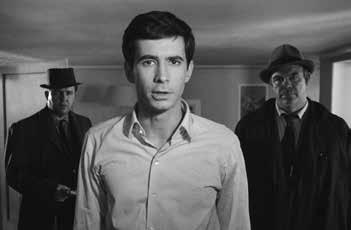
“The greatest Western ever made.” John Carpenter
A sheriff enlists the help of an unlikely set of heroes, including a drunk, a teenager, and an old man with a bum leg, to keep order in a town beset by a corrupt rancher and his men. Rio Bravo warrants its place in the pantheon of Westerns not for its plot but its characters: Quentin Tarantino famously describes it as a great “hangout movie,” meaning that its main pleasure is in spending time with John Wayne’s sheriff and his sidekicks. Wayne’s star power forms a new constellation with crooner Dean Martin as an alcoholic deputee out for redemption, teen heartthrob Ricky Nelson as a young gunslinger, and breakout Angie Dickinson as a seductive gambler with dubious morals. Rio Bravo seamlessly blends comedy, romance, action—and even musical interludes—in Howard Hawks’s late-career masterpiece.
June 22 (Thursday) 8:10 pm
June 24 (Saturday) 6:30 pm
July 3 (Monday) 7:00 pm
Boat People
投奔怒海
Hong Kong 1982
Ann Hui
106 min. DCP
In Cantonese, Vietnamese, and Japanese with English subtitles
Ann Hui’s most celebrated film follows a Japanese photojournalist (George Lam) uncovering the harsh living conditions in rural Vietnam after the communist takeover. Despite its compassionate take on the plight of Vietnamese refugees, Boat People was controversial on its release: it had to be presented as a surprise, outof-competition screening at the 1983 Cannes Film Festival over worries that it was too critical of the Vietnamese regime. (China, by contrast, banned the film for not being critical enough). In part because her cinema straddles tense geopolitical boundaries—her films are produced in Hong Kong, shot in Mainland China, and frequently explore transnational identities and conflicts—Hui’s work is woefully underappreciated outside of Asia. This new restoration provides a rare opportunity to see a masterpiece by one of the most prolific and influential auteurs of the Hong Kong New Wave. Boat People also features Cantopop superstar Andy Lau in one of his first film roles.
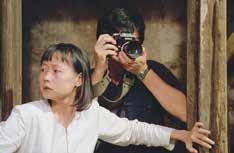
Best Film, Director, Screenplay, New Performer, Art Direction
Hong Kong Film Awards, 1983
One of the 100 greatest Hong Kong films (#2)
Time Out, 2017
3
Unsettled Settings Ryan Ermacora & Jessica Johnson

May 18–20
Scarred, forgotten, overgrown: the British Columbia locations spotlighted by Vancouver-based filmmakers Ryan Ermacora and Jessica Johnson are consistently unsettling. The duo’s experimental documentaries see BC’s remote landscapes as both irreparably scarred by industry and holding hope for enchantment and renewal. A commitment to analogue cinematography emphasizes the strange natural beauty of these rarely photographed places, and the imperfections of the image—grain, light leaks, dust, scratches—reinforce a sense of fragility and impermanence. In some ways, their work is similar to that of other filmmakers concerned with both the material processes of cinema and the ethics of industrial labour, including Wang Bing, Kevin Jerome Everson, and Lucien Castaing-Taylor and Véréna Paravel (who are also featured at The Cinematheque in May with their new film De Humani Corporis Fabrica). However, Ermacora and Johnson also exhibit an utterly unique artistic vision grounded in BC’s unceded territories and industrial ruins. Watch for recurring motifs of frames-within-frames and offscreen sound, as well as nods to the conventions of early cinema through static long takes, sparse cuts, and square-ish framing.
Ermacora and Johnson are both mainstays in Vancouver’s film community, having screened their films at multiple editions of the Vancouver International Film Festival and the DOXA Documentary Film Festival since 2015. (You may even occasionally glimpse Ermacora working up in the projection booths at The Cinematheque and VIFF Centre.) While their films are almost exclusively set in BC (the exception being Johnson’s Scottish-set Hazel Isle), Johnson and Ermacora have been celebrated nationally with a 2019 retrospective at the AGO in Ontario and internationally with screenings in Germany, South Korea, Mexico, France, and beyond. The Cinematheque is delighted to bring this retrospective, which showcases all of Ermacora and Johnson’s solo and collaborative documentary shorts, as well as their 2022 feature Anyox, home.
4
“The foremost landscape filmmakers in the country.”
Kurt Walker, filmmaker
Anyox Canada 2022
Ryan Ermacora, Jessica Johnson
87 min. DCP
The first feature by Vancouver-based filmmaking team Ermacora and Johnson, who have been collaborating on celebrated documentary shorts for over a decade, provides an enigmatic portrait of a nearly-abandoned mining town in northwestern BC. Anyox shares a number of characteristics with the duo’s previous projects, including a strong emphasis on analogue film processes and a focus on labour and environmental exploitation in British Columbia’s remote and unseen places. Anyox, formerly a company town owned by a copper mining company, has been reduced to otherworldly mounds of dark gray slag, and the stunning 35mm and 65mm cinematography (by longtime DP Jeremy Cox) brings out the elemental qualities of this strange, forgotten place. But Ermacora and Johnson are also trying something radically new, immersing the viewer in the tantalizing and sometimes frustrating process of archival research. Anyox is experimental filmmaking at its best.

“A deeply beautiful film … Ghosts don’t rest easily here.”
Dorothy Woodend, The Tyee
The opening night program of “Unsettled Settings” will include a screening of Anyox followed by a discussion with the filmmakers. There will then be a short break before a screening of Sharon Lockhart’s NŌ, which was chosen by Ermacora and Johnson to pair thematically with their films.
Co-presented with The Polygon Gallery
followed by (May 18 only)
The Polygon Gallery is a vibrant art institution that inspires and provokes cultural insight through adventurous programming. Its lens of inquiry creatively responds to shifting perceptions of the world, through the histories and evolving technologies of photography and related media.
NŌ USA 2003
Sharon Lockhart
32 min. 16mm
Ermacora & Johnson Select
“The following moment always contains, over and above the preceding one, the memory the latter has left it.”
Gilles Deleuze, Bergsonism


By way of a measured field and a prompt, we see Ito Masa and Yoko, two farmers, rake out piles of hay choreographed in accordance with the field of view of the lens. NŌ presents a collaboration between the labour of the farmers and the optics of cinema, unfolding as a tapestry of a landscape through time. The delicate and intentional method in which we experience this changing image presents an opportunity to consider the altering of colour, texture, and composition of the landscape. At work here is the effect of duration in dialogue with the experience of labour, as well as a formal game, one which subtly plays with our expectations concerning the objectivity of documentary, and the construction of a frame.
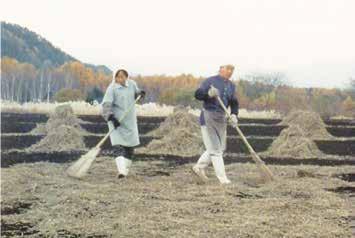
—Ryan Ermacora and Jessica Johnson
The May 20 screening of Anyox will include a Q&A with Ermacora and Johnson moderated by filmmaker Antoine Bourges (Concrete Valley, Fail to Appear).
Screening Partner
MDFF Selects
MDFF Selects is a showcase of the world’s best, most challenging, and most provocative new international cinema.
5 May 18 (Thursday) Opening Night 7:00 pm May 20 (Saturday) 8:15 pm May 22 (Monday) 6:30 pm
Ermacora & Johnson Shorts
Total running time: 74 min.
May 20 (Saturday) 6:30 pm
May 22 (Monday) 8:30 pm
E&N
Canada 2015
Ryan Ermacora, Jessica Johnson 4 min. DCP
Reminiscent of 19th century “phantom ride” films, E&N critiques industrial technology and power by linking train transportation in British Columbia to a history of colonial exploitation.

Einst
Canada 2016
Jessica Johnson
12 min. DCP
A single long take of a placid tree-lined pond becomes a cinematic magic trick that plays on ideas of landscape, light, water, and time.
Hazel Isle
Canada 2018
Jessica Johnson
13 min. DCP
The only film in the series shot outside of BC, Hazel Isle follows Johnson to the Isle of Coll in Scotland. A conversation about the misappropriation of Gaelic place names resonates with broader themes in the series of colonial power and land acknowledgment.

Ocean Falls
Canada 2015
Ryan Ermacora, Jessica Johnson
13 min. DCP
A once-bustling company town in BC’s central coast, now nearly abandoned, is captured in a series of contemplative static frames. A recurring motif of natural beauty framed through the windows of decaying buildings highlights the impermanence of human action.
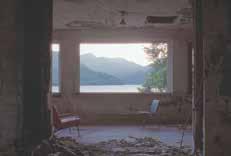
Empire Valley
Canada 2018
Ryan Ermacora
13 min. DCP
The arid vistas of Tsilhqot’in territory in central BC are framed in sweeping widescreen (unusual for Ermacora and Johnson’s work). The extreme distance of the camera is contrasted by an intimate sound design that highlights the disruptive impact of resource extraction.


Labour/Leisure
Canada 2019
Ryan Ermacora, Jessica Johnson
19 min. DCP
Migrant workers pick and package Okanagan cherries in orchards circumscribed by golf courses and expensive houses.

6
New Canadian Cinema
May 19 (Friday) 6:30 pm
May 23 (Tuesday) 8:30 pm
May 27 (Saturday) 8:30 pm
May 29 (Monday) 6:00 pm
The Maiden
Canada 2022
Graham Foy
117 min. DCP
The debut feature of Edmonton-born writer-director Graham Foy is something special. A free-floating portrait of adolescent malaise in the suburbs of Alberta, it renders the pangs of teenhood into worlds nebulous and strange—worlds truer to the lived emotions of youth. The film’s dreamlike narrative opens with two inseparable skateboarders (Jackson Sluiter and Marcel T. Jiménez), whose languid Prairie summer is curtailed by sudden tragedy. In the fog of trauma that follows, the diary of a missing girl (Hayley Ness) is discovered and the movie’s structural slippage begins. The Maiden is the latest auteur-driven film from Canadian indie outfit MDFF (subject of a Cinematheque retrospective in 2021). Absorbing the grammar of “death trilogy”era Van Sant, Foy fashions a tender ode to teenage melancholia that, in a bewitching final act, glides delicately into metaphysical, Apichatpongian territory. TIFF hails Foy a “visionary new artist.” We concur.
“Economical, elliptical, and altogether haunting … A film that knows what it’s doing—and surprises us at those moments when it reveals its larger design.”

Jonathan Romney, Screen International
June 9 (Friday) 6:30 pm
June 11 (Sunday) 8:40 pm
June 13 (Tuesday) 6:30 pm
preceded by
Cette maison (This
House)
Canada 2022
Miryam Charles
73 min. DCP
In French and Haitian Creole with English subtitles
“A reflexive, imaginative reckoning with the death of a loved one … Poignant and formally intriguing … Slow, strange, beautiful.”
Sophia Satchell Baeza, Sight and Sound

A haunting meditation on grief through the prism of art, Montreal-based filmmaker Miryam Charles’s enigmatic and strikingly assured debut feature was one of the standout works of Canadian cinema in 2022. Charles, who has built an impressive body of abstract, experimental shorts over the past eight years, centres her ethereal film on a family trauma of almost unfathomable pain. In 2008, the director’s teenage cousin Tessa was found hanged in her room; the autopsy revealed she was raped and murdered. Cette maison relays this tragedy by way of a resurrected Tessa (Schelby Jean-Baptiste). Reunited with her mother (Florence Blain Mbaye), she reflects on her abbreviated existence and the woman she will never become. Employing heightened artifice, delicate 16mm photography, staged reenactments, and lived-in perspectives on the diasporic experience (Charles, like her cousin, is of Haitian descent), Cette maison offers a poignant, personal requiem for vanished lives—and solace, one hopes, for those living with the loss.
TIFF Canada’s Top Ten 2022
Vole, vole tristesse
(Fly, Fly Sadness)
Canada/Haiti 2015

Miryam Charles
6 min. DCP
In French with English subtitles
Charles’s first short, a lyrical musing on an imagined nuclear explosion that erases the voices of an island’s people, established the analogue aesthetic and allegorical sensibilities of the gifted Haitian Canadian artist.
Drei Atlas (Three Atlas)
Canada/Haiti 2018
Miryam Charles

7 min. DCP
In German and Haitian Creole with English subtitles
A housemaid is interrogated after the murder of her former employer in Charles’s beguiling 16mm short, which reckons with xenophobia through supernatural lore and the absence of onscreen characters.
7
Learning & Outreach Summer 2023
Cinelab
Cinelab is a two-week long summer filmmaking program for aspiring artists aged 14–19 presented by The Cinematheque in partnership with the SFU School for the Contemporary Arts. Young artists are empowered to create unique short films from start to finish with the support of experienced professionals. In small crews, participants are guided through the complete filmmaking process from scripting to directing, to lighting and editing. After each participant’s creative vision is brought to life, completed works debut at a special red carpet film premiere at The Cinematheque.
Ages 14–19
Program 1: July 10–21
Program 2: July 24–August 4
Daily schedule: Monday to Friday, 9:00 am–4:00 pm
Location: SFU School for the Contemporary Arts
149 West Hastings Street, Vancouver
Cost: $650
The Cinematheque is a not-for-profit organization and this program fee is subsidized by support from our sponsors. Our sponsors generously donate limited bursaries for participants in need of financial assistance. Visit cinelab.ca for more information.
Learn more and register at cinelab.ca
Supported by:
The City of North Vancouver Creative BC
SFU School for the Contemporary Arts
UBC Summer Filmmaking Camps
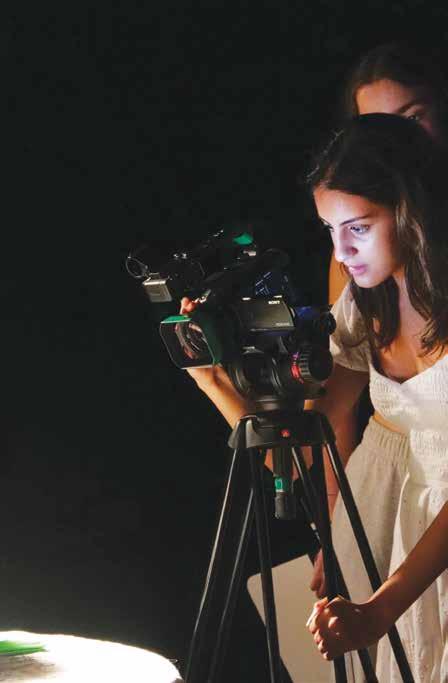
The Cinematheque runs yearly spring break and summer camps in partnership with UBC Recreation.
Our Animazing! Stop-motion Animation camp for participants aged 8–10 introduces campers to the basics of movie making with a series of stop-motion animation projects. Each day, participants learn a different technique, from claymation to pixilation to cutouts, culminating in a showstopping final project.
We provide an inclusive, welcoming, and creative space with professional equipment, facilitated by experienced artists. Established professionals from the Vancouver creative scene deliver master classes throughout the program.
Children and youth participating in our filmmaking programs are now eligible for a chance to see their work on the big screen! Each month, we will select a Learning & Outreach production to play before our regular Film Club screening.
vimeo.com/thecinematheque
Action! Filmmaking, for participants aged 11–13, empowers youth to create original short films using professional equipment. Campers decide on the content, style, and tone of their own films, while experienced facilitators provide technical assistance and artistic mentorship.
Ages 8–10
Animazing! Program 1: July 10–14
Animazing! Program 2: July 24–28
Ages 11–13
Action! Program 1: July 17–21
Action! Program 2: July 31–August 4
Location: The Cambrian Hall
215 East 17th Avenue, Vancouver
Learn more and register at recreation.ubc.ca/camps/
8
Watch Cinelab films created in past programs on our Vimeo channel:
2-Day Small File Filmmaking Workshop

May 20 (Saturday) 10:00 am
May 21 (Sunday) 10:00 am
Ages: 18+
Interested in filmmaking but intimidated by expensive equipment and fancy software? Learn the hyper-creative, environmentally friendly, punk-chic practice of small file filmmaking! The Cinematheque has teamed up with the Small File Media Festival to offer this two-day workshop on making films with tiny carbon footprints and huge creative impact.

Saturday’s workshop will cover the basic steps of filmmaking (pre-production, shooting, editing) as well as the motivations and techniques behind small file filmmaking. While mainstream media is becoming increasingly high-definition, with proportionally higher electricity demands for streaming and storing, small file films embrace glitchy images and abstract compositions. Participants will watch a selection of small file films for inspiration before forming small groups to plan their own original projects. On Sunday, we will cover camera and lighting techniques before shooting and editing the films. All films produced will be eligible for the 2023 Small File Media Festival on The Cinematheque’s big screen in October.
All levels of experience are welcome!
Dates:
May 20 (Saturday) 10:00 am–4:00 pm
May 21 (Sunday) 10:00 am–4:00 pm
Location: We will meet in the lobby of The Cinematheque on both days.
Cost: Free
Please note that spots in our filmmaking workshops are very limited and in demand. Generous support from the Canada Council for the Arts makes it possible for us to waive our usual registration fee.




We acknowledge the support of the Canada Council for the Arts.
おやすみ (oyasumi)
A collection of Japanese Canadian short films, co-presented with Powell Street Festival Society
May 25
May 25 (Thursday) 7:00 pm
Films in this program include English and Japanese dialogue. All films will screen with either subtitles or open captions in English.
おやすみ (oyasumi )—or “goodnight” in Japanese—is often the last thing you hear before you close your eyes and drift off into darkness.
おやすみ stems from the verb 休む ( yasumu), which means “to take a break” or “to be absent.” It implies a moment of rest, a moment to pause, a moment when no one is there. This program brings together 12 short films that demonstrate the many definitions of おやすみ while highlighting the past 30 years of Japanese Canadian filmmaking. This collection (not a retrospective!) reveals stories of intergenerational memories, unspoken histories, and the process of healing. Although bittersweet in their themes, there is a comfort in these films coming together—like a kiss on the forehead as you fall asleep.
Total running time: 88 min.
Introduced by Natalie Murao, curator of おやすみ
After the screening, there will be a Q&A with the filmmakers in attendance.
The Powell Street Festival first took place in 1977 and has since expanded to be one of the largest and longest-running community arts festivals in Canada.
The Powell Street Festival Society now functions as a non-profit registered charity arts organization based in Vancouver and the Paueru Gai Area—today known as the Downtown Eastside—located on the unceded territories of the S ḵ w x̱wú7mesh (Squamish), səlilw ətaɬ (Tsleil-Waututh), and xʷm əθkʷəy̓əm (Musqueam) Nations.
In addition to its signature event, The Powell Street Festival, the Society offers yearround programs and collaborates with local, national, and international organizations, artists, and communities to advance equity and well-being for all.
Sol
2023. Meredith Hama-Brown. 6 min.
A woman grieving the recent loss of her partner has a mysterious alien encounter in her backyard.

舌 Tongue
2022. Kaho Yoshida. 2 min.
Tired of being talked at by men, a woman takes a sensual trip with unusual friends.

頂 Itadaku
2022. Sophia Wolfe. 8 min.
頂 (itadaku), meaning to receive, accept, or take, is a meditative ritual and an attempt to connect with the ancestors.


10
Amabie
2020. Cindy Mochizuki. 2 min.
Artist Cindy Mochizuki asks her mother about the three-legged mermaid-like creature known as amabie

Akashi あかし
2017. Mayumi Yoshida. 10 min.
When a struggling artist returns to Japan for her grandmother’s funeral, a staggering family secret upends everything she’s ever wanted out of life and love.

Yellow Sticky Notes

2007. Jeff Chiba Stearns. 6 min.
A visual self-reflection using the same yellow sticky notes that consumed a filmmaker’s life and blinded him to major world events.
Advisory: Gun violence
In the Shadow of the Pines
2020. Anne Koizumi. 8 min.
A filmmaker reflects on the childhood shame she felt about her immigrant father and how it shaped her identity.
Late Night
2017. Kodai Yanagawa. 5 min.
Lush plants mysteriously grow through the walls and a man is transported into the forest of his memory.

Sayonara Super 8
2006. Pia Yona Massie. 6 min.

Personal archival footage is used to ask questions about the fragile nature of memory, human relationships, and the foibles of the medium itself.
RICECAKE
2019. Yuko Fedrau. 8 min.
Local drag artist and mother of House of Rice Shay Dior introduces us to RICECAKE, Vancouver’s queer Asian dance party.

Fish in Barrel
2009. Randall Okita. 8 min.
The struggles of a young man facing his demons erupt into visions that question what lies below the surface.

Advisory: Implied suicide
Minoru: Memory of Exile
1992. Michael Fukushima. 19 min.
In a blend of hand-drawn animation and archival materials, Minoru and his son, director Michael Fukushima, narrate their family’s internment, deportation and eventual return to Canada.

Advisory: Racism and internment

11
Second Annual Vancouver Greek Film Festival
June 1–4
The Hellenic Canadian Congress of BC and The Cinematheque present the second Vancouver Greek Film Festival, an in-person event hosted at The Cinematheque. This second edition, like the first, is a celebration of film as art, and we are pleased to present an eclectic offering of contemporary and classic Greek cinema. This year, the festival kicks off a calendar of events organized by the Congress during Greek Heritage Month, the month of June, which culminates in “Greek Day on Broadway,” one of Vancouver’s most famous street festivals, on Sunday, June 25.
“When people think of Greek culture, they often associate it with the ancient past,” says Christos Dikeakos, visual artist and cofounder of the VGFF. “We hope that the second annual Vancouver Greek Film Festival will continue our tradition of introducing a more contemporary experience of Greek culture to diverse audiences in the Lower Mainland. In particular, Greek cinema has been making breakthroughs in storytelling in recent years, with women directors leading the way. We’re excited to be able to share a tightly curated program that offers a unique chance to discover the riches of Greek cinema.”
From its inception, the festival’s aim has been to focus on the contributions that Greek filmmakers have made—and continue to make—to film history and culture. The program presents a myriad of stories and experiences about the human condition, offering insight into the minds of Greek filmmakers that is at once intimate and universal.


We are proud to highlight Greek women in film, especially emerging and established female directors. Many of their films speak to political, social, and economic issues in contemporary Greek society, all with compassion and humanity.
This year’s festival is again curated into four streams: “From the Archive,” a look back on classics of Greek cinema; “Celebrating Greek Auteurs and Artists,” stories by and about iconic Greek artists; “Contemporary Greek Cinema,” a selection of recent titles making waves at home and abroad; and “Greeks in Diaspora,” films made by Greek directors from around the world.
Highlights of this year’s celebration include a rare 35mm presentation of Elia Kazan’s epic America America on opening night; a screening of the recently restored 1970 film Reconstruction, the first feature of famed Greek auteur Theo Angelopoulos; three dramatic features and three dramatic shorts directed by women, many of which won awards at the Hellenic Film Academy Awards; and a closing night tribute to the late, beloved Olympia Dukakis, in the form of a feature-length documentary on her life and legacy, Olympia
Enjoy yourselves!
Harry Killas Curator, Vancouver Greek Film Festival
καλά να περάσεις
The Vancouver Greek Film Festival is organized by Harry Killas, curator and co-founder; Johanna Killas, assistant curator; Christos Dikeakos, co-founder; The Cinematheque; and the Hellenic Canadian Congress of BC.
Program notes written by Harry Killas and Johanna Killas unless otherwise credited
From
the Archive / Greeks in Diaspora

Contemporary Greek Cinema: Spotlight on Women in Greek Film


America America
USA 1963
Elia Kazan
174 min. 35mm
35mm Print
“Kazan’s masterpiece, the movie he was born to make.”
Tom Charity, Cinema Scope
Newcomer Stathis Giallelis plays a young Greek from Anatolia who stops at nothing to secure a passage to America. Nominated for four Academy Awards including Best Picture and Best Director—it won Best Art Direction (Black-and-White)—America America was Greek American director Elia Kazan’s favourite, and in his view most important, of his films. Lensed by legend Haskell Wexler and based on Kazan family myths and legends, the film powerfully reimagines the Hollywood epic in anticipation of the auteur-oriented “New Hollywood,” with non-actors, handheld camerawork, and a rugged, emotional immediacy. This compelling story of survival resonates today as a tribute to immigrant families, regardless of origin, whose arrival in a new country is marked by struggle. In 2001, America America was added to the US National Film Registry.
Days and Nights of Demetra K.
Greece 2021
Eva Stefani
72 min. DCP
In Greek with English subtitles
Vancouver Premiere
A portrait of the life of Demetra K., a sex worker and union organizer in Greece. Filmed over a period of ten years, the documentary presents episodes from Demetra K.’s life at the brothel she runs and at home with her 17 dogs. Intimate, up-close, and personal, Days and Nights of Demetra K. slyly addresses social-political themes of the nature of labour, unionization, and sex work—all within the torment of the recent Greek depression. Winner of Best Documentary at the 2022 Hellenic Film Academy Awards.
preceded by Neighbours
Greece 2018
Evi Kalogiropoulou
15 min. DCP
In Greek with English subtitles
Kalogiropoulou’s video documents a scrap metal yard in the Votanikos neighbourhood in the centre of Athens, and the family that has been working there for over forty years. The area has been a nexus of constant transformation: an ancient olive grove transformed over time into an industrial zone, now surrounded by Roma settlements and refugee camps. Through movingcamera cinematography and conversations with scrap yard workers, Kalogiropoulou hones in on themes of immigration, land ownership, and machismo in a marginalized and often unseen economy. —New Museum, New York
13
Μέρες
και νύχτες της Δήμητρας Κ.
June 1 (Thursday) Opening Night 7:00 pm June 2 (Friday) 6:30 pm
“The essence of Greek cinema is its diverse and intricate embrace of how to picture life’s experiences.”
Christos Dikeakos
Contemporary Greek Cinema: Spotlight on Women in Greek Film Contemporary Greek Cinema
June 2 (Friday) 8:30 pm
June 3 (Saturday) 6:30 pm
Holy Emy
Greece 2021
Araceli Lemos
111 min. DCP
In Tagalog, Greek, and English with English subtitles
Vancouver Premiere
After their mother is forced to return to the Philippines, sisters Emy (Abigael Loma) and Teresa (Hasmine Killip) live a quiet life within their tight-knit Filipino Catholic community in the port of Athens. But when Teresa gets pregnant, Emy is drawn to an overwhelming and mysterious inner force. Winner of Best Film Director (Lemos) and Best Supporting Actress (Hasmine Killip) at the 2022 Hellenic Film Academy Awards, Holy Emy provides an unusually fresh take on the place of new immigrants to Greece, and displays remarkable, assured, and fascinating performances.
“Magnificent … A radiant yet destabilizing debut feature film which manages to masterfully combine social drama, Cronenberg-style horror, mysticism, and modernity.”
 Muriel Del Don, Cineuropa
Muriel Del Don, Cineuropa
Magnetic Fields
Greece 2021
Yorgos Goussis
78 min. DCP
In Greek with English subtitles
Vancouver Premiere
“One of the most promising Greek film debuts of recent years … Disarming and generous.”

Panos Gena, Cinemagazine
Having met by chance on the way to an island, a woman and a man decide to wander around together in search of a good place to bury a metallic box in this charming comedy. Magnetic Fields confidently displays unique camera and acting cinesthetics that are reminiscent of the deadpan art cinema of Jim Jarmusch and Aki Kaurismaki. Winner of five Hellenic Film Academy Awards in 2022, including Best Feature Film, Best Newcomer (for director Yorgos Goussis), and two awards for lead Elena Topalidou (Best Actress and Best Screenplay, the latter shared with Goussis and co-star Antonis Tsiotsiopoulos).
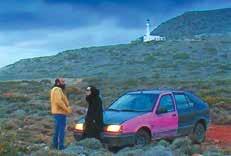
preceded by
Contemporary Greek Cinema: Spotlight on Women in Greek Film
On Xerxes’ Throne
Greece 2021
Evi Kalogiropoulou
15 min. DCP
In Greek with English subtitles
According to local legend, the Persian King Xerxes watched the overwhelming defeat of his fleet from his throne on the rocky peaks of Mount Egaleo (in today’s Perama). As if in that same position, visual artist and filmmaker Evi Kalogiropoulou observes her actors from a distance, placing them on the “throne” determined by each person’s own little world—be it an automated piece of heavy machinery or a section of metal scaffolding. On Xerxes’ Throne received the Canal+ Award for Short Film in Critic’s Week at the 2022 Cannes Film Festival. —Onassis
Foundation
14
Μαγνητικά πεδία
Αγία Έμυ
Στον θρόνο του Ξέρξη
“[A] remarkably assured monochrome debut … One could see [this] rural policier as the mirror opposite to a film like Elia Kazan’s melodramatic emigration saga America America.”
David Jenkins, Sight and Sound, on Reconstruction
From the Archive / Celebrating Greek Auteurs and Artists
June 3 (Saturday) 8:30 pm
Contemporary Greek Cinema: Spotlight on Women in Greek Film
June 4 (Sunday) 2:00 pm
Celebrating Greek Auteurs and Artists / Greeks in Diaspora
June 4 (Sunday) 7:00 pm
Reconstruction Αναπαράσταση
Greece 1970
Theo Angelopoulos
100 min. DCP
In Greek with English subtitles
New Restoration
Theo Angelopoulos, one of Greece’s most acclaimed auteurs, with one of European cinema’s most distinctive signatures, catapulted onto the world stage with this award-winning mystery set in a remote mountain village in Epirus. With the help of her lover, a woman murders her husband, recently returned from Germany where he had gone to work. The crime is never shown on screen. The main characters—judge, policemen, journalists—try to reconstruct and understand the events. Reconstruction was described at the time by film critic Vassilis Rafailidis as the first “grownup” film of Greek cinema. It has been consistently singled out as one of the most important Greek films of all time. Winner of Best Film, Best Director, Best Supporting Actress, and Best Cinematography at the Thessaloniki Festival of Greek Cinema in 1970.
“Angelopoulos’s first feature remains one of his finest films, and surely counts as one of the most remarkable debuts ever made … Sheer brilliance.”
Geoff Andrew, Time Out
Tailor
Ράφτης
Greece 2020
Sonia Liza Kenterman 100 min. DCP
In Greek and Russian with English subtitles “Kenterman offers [something] personal and touching to the harshest and darkest moments in recent Greek history … Through Nikos, she creates a parallel world, so romantic that it’s almost out-of-time.”

Vassilis Economou, Tallinn Black Nights Film Festival
When the bank threatens to repossess middle-aged bachelor Nikos’s tailor shop after his father falls ill, Nikos decides to reinvent himself as a travelling tailor, bringing style and confidence to the women of Athens. Superlatively written and directed, with visual storytelling derived from the silent comedy tradition, Kenterman’s first feature is pure pleasure from first to last frame. Winner of Best Costume Design and Best Original Musical Score at the 2021 Hellenic Film Academy Awards.
Olympia
USA 2018
Harry Mavromichalis
100 min. DCP
A moving and charming portrait of Academy Award-winning actress and theatre icon Olympia Dukakis. Dukakis is well-known and beloved to audiences internationally for her performances on stage and in classic films like Moonstruck and Steel Magnolias, as well as in the television mini-series Tales from the City But what did it take for her to achieve this success? With unprecedented access to Dukakis, her family, and the story of her life, Greek American filmmaker Harry Mavromichalis reveals both the public and private aspects of a woman who faced obstacle after obstacle, as she created a singular life in the arts.—Official synopsis
preceded by
Contemporary Greek Cinema: Spotlight on Women in Greek Film

To Vancouver
Το βανκούβερ
Greece 2021
Artemis Anastasiadou
24 min. DCP
In Greek with English subtitles
Two siblings, one spell, wounded landscapes, and an inevitable departure. To Vancouver is a short chronicle of a disappearing act in the times of the new depression. Influenced by the great tradition of Italian and Greek neorealist films of the 1940s and ’50s, To Vancouver won Best Short Film at the 2022 Hellenic Film Academy Awards.

15
Fearful Symmetry The Films of Lee Changdong
June 8–July 2
Co-presented with the Korean Film Festival Canada
In the decade since The Cinematheque’s last major presentation of a Korean auteur’s work, the country’s profile, already hailed as far back as 1996 by Tony Rayns as “the most cinephile country in the world,” has done nothing but rise. Few directors have had a better vantage point to this influx of blockbuster budgets and prestigious awards than ex-novelist and filmmaker Lee Changdong, a transitional figure between two generations of New Korean Cinema filmmakers: the student-activist aligned, government-suppression battling first wave of the late ’80s and ’90s (Park Kwangsu, Jang Sunwoo), and the video educated, globe conquering second wave of the ’00s to the present (Bong Joon Ho, Park Chanwook).
Hard to predict—except that he works at the methodical pace of two films per decade, and never with the same cinematographer twice—Lee is a director of generous yet uncompromising films and a politically and intellectually fearless figure in Korean culture. The Cinematheque is proud to present, along with the Korean Film Festival Canada, a complete retrospective of Lee’s feature films.
Lee’s meticulous, expansive cinema generates tensions: between realism and melodrama, self and other, physical objects and the elusive thoughts they generate. It’s possible, by the end of any of his films, to construct two simultaneous perspectives on the world: the presentable one, and its double, populated by the ghosts of transformative ideas and forking paths. This cinematic sleight-of-hand is possible, in part, because of the way Lee collaborates with actors. Steven Yeun, whose finest work to date remains his role in Lee’s Burning, has spoken of the incredible level of trust conveyed on set. Early in his career, Lee’s tendency to repeat takes until he caught the precise degree of emotion necessary to carry a scene past “the difference between 99% and 100%,” earned him a near-Kubrickian reputation.
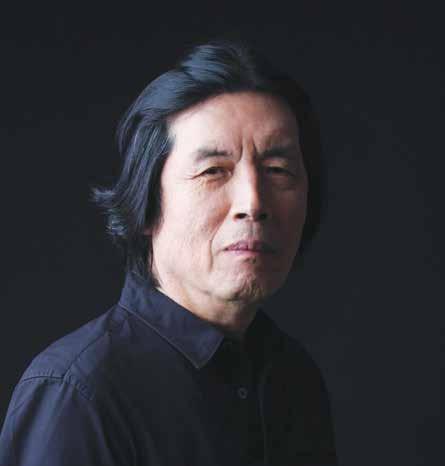
16
The Korean Film Festival Canada (KFFC) is a Montreal-based non-profit arts organization that specializes in thematic festivals presenting films from Korea, Canada, and beyond. This year, the KFFC celebrates its 10th edition and 27 years since the creation of Arts East-West (formerly Ciné-Asie), producer of the festival. Focusing on Asian empowerment and diasporic arts through cinema, new media, and visual arts, the innovative projects of Arts East-West span exhibitions, seminars, workshops, and publications facilitating Asian arts.
This precision also extends to character dynamics, which Lee fusses over in script treatments that resemble novellas. (After the success of Poetry, he and collaborator Oh Jungmi wrote and discarded three of these scripts before arriving at what would become Burning, eight years later.) Despite the often twohour-plus runtimes of his films, Lee is not interested in sprawling casts of characters or far-flung locales. Everything is compressed; we encounter strong duos, trios, and loners, hardly more. The “conflict” in these films reads more like a fusion: of Makdong and the crime lord he might resemble (Green Fish), of Yongho and his past selves (Peppermint Candy), of the outcasts Jongdu and Gongju (Oasis), of the images in the final moments of Secret Sunshine and Poetry, and so on.
The origin of this narrative approach has long been thought to be locatable in Lee’s pre-cinematic career as a writer of novels and short stories—his works include the prize-winning Spoils of War (1983) and Nokcheon (1992), neither currently available in English translations. But, though he can be grouped in with other secondcareer directors who left novels behind, like Catherine Breillat and Ousmane Sembène, this is only part of the picture. Lee rejects any semiotic film theories that would have a shot functioning like a sentence (a scene like a paragraph, etc.). When pressed to turn his treatment for Peppermint Candy into a published novel, he pointed out that the entire film hangs together on a transformative principle of time. With each film, Lee says, he needs to return to a similar question—what makes this necessary as a film, rather than something he could publish without the problems of film financing and the strain and labour required by weeks of shooting?
Unlike his New Korean Cinema contemporaries Bong Joon Ho and Park Chanwook, Lee never attended film school. Instead, he learned the practical matters of what directing requires on the set of sculptor turned countercinema director Park Kwangsu, who took an interest in Lee’s literary connections and hired him to write scripts for two films (To the Starry Isle and A Single Spark). Rather than his life as a novelist informing his cinematic work, it might be closer to the truth to say that it is Lee’s many lives—as a director and actor in the theatre scene, a world he was introduced to by his older brother from a young age; as a high-school teacher; as the son of leftist parents, but whose hometown was Daegu, a stronghold of right-wing politics—that prepared him to become, at the age of 43, such a clear and confident director of ambitious material.
“Fearful Symmetry” offers up new restorations of Peppermint Candy and Oasis, long out of theatrical circulation, as well as Poetry. They are joined by the hard-to-see Green Fish and major triumphs Secret Sunshine and Burning.
June 8 (Thursday Opening Night 7:00 pm
June 11 (Sunday) 6:00 pm
June 24 (Saturday) 8:50 pm
Peppermint Candy
박하사탕
South Korea 1999
Lee Changdong
131 min. DCP
In Korean with English subtitles
New Restoration
Lee Changdong’s second feature, a cubist portrait of a soldier turned cop turned business professional, turns the normal rules of chronology inside out, all while in full gallop across the terrain of two decades of Korean history. In this vortex of time, we move forward, while Yong-ho (Sol Kyunggu) is repeatedly revived, contradicted, obliterated, and redescribed in events that map onto an extreme picaresque through the past, beginning with the edge of the millennium and ending just before the Gwangju massacre. It would be impossible to miss the cast’s fiercely committed performances or Lee Jaejin’s bright and haunting score, but what marks this as Lee’s first masterpiece is how these elements, coupled to the dream-logic recurrence of actors, songs, objects, and lines of dialogue, ignite a sense of all-consuming mystery. If life, as in Kierkegaard’s line, can only be understood backwards, but lived forwards, Lee lets us have it both ways at once.
“Necessary to any introduction to the Korean New Wave … A work of deep conviction, passion, and anger.”

Rahul Hamid, Senses of Cinema
The June 8 screening of Peppermint Candy will include opening remarks by Michael Scoular, The Cinematheque’s Programming Associate.
17
“The evolution of Lee Changdong has been one of the glories of contemporary movies.”
Ignatiy Vishnevetsky, Cine-File


May New Cinema 27 6:30 pm Walk Up New Canadian Cinema 8:30 pm The Maiden Greek Film Festival 3 6:30 pm Magnetic Fields + On Xerxes’ Throne 8:30 pm Reconstruction June Sunday Monday Tuesday Wednesday Thursday Friday Saturday Ermacora & Johnson 18 Opening Night 7:00 pm Anyox + NŌ Guests Ermacora & Johnson 22 6:30 pm Anyox 8:30 pm Ermacora & Johnson Shorts New Canadian Cinema 19 6:30 pm The Maiden New Cinema 8:50 pm Walk Up Learning & Outreach 20 10:00 am Small File Filmmaking Workshop (Day 1) New Cinema 4:00 pm Turning Red Ermacora & Johnson 6:30 pm Ermacora & Johnson Shorts 8:15 pm Anyox Guests Learning & Outreach 21 10:00 am Small File Filmmaking Workshop (Day 2) Film Club 11:00 am Turning Red New Cinema 7:00 pm A New Old Play DOXA Documentary Film Festival 2023 May 4–14 Frames of Mind 17 7:00 pm Selvportrett Guest New Cinema 15 6:30 pm Walk Up New Restoration 8:30 pm The Trial The Image Before Us 24 6:30 pm From Milltown to Metropolis: Vancouver Experimental Film Guest 8:30 pm Mighty Jerome + Hardwood New Restoration 23 6:00 pm The Trial New Canadian Cinema 8:30 pm The Maiden Powell Street 25 Festival Society 7:00 pm おやすみ (oyasumi) Guests New Documentary 26 6:30 pm De Humani Corporis Fabrica New Restoration 8:50 pm The Trial DIM Cinema 31 7:00 pm Nature New Canadian 29 Cinema 6:00 pm The Maiden New Documentary 8:30 pm De Humani Corporis Fabrica New Canadian Cinema 9 6:30 pm Cette maison + Vole, vole tristesse + Drei Atlas Lee Changdong 8:30 pm Oasis Greek Film Festival 1 Opening Night 7:00 pm America America Greek Film Festival 2 6:30 pm Days and Nights of Demetra K. + Neighbours 8:30 pm Holy Emy 16 30 New Cinema 28 7:00 pm A New Old Play Greek Film Festival 4 2:00 pm Tailor 7:00 pm Olympia + To Vancouver New Documentary 5 6:00 pm De Humani Corporis Fabrica New Restoration 8:30 pm The Trial The Image Before Us 7 6:30 pm Double Happiness 8:30 pm On the Corner Korean Film Festival 6 Canada 7:00 pm Golden Delicious Guest Lee Changdong 8 Opening Night 7:00 pm Peppermint Candy Lee Changdong 10 6:00 pm Green Fish 8:20 pm Secret Sunshine
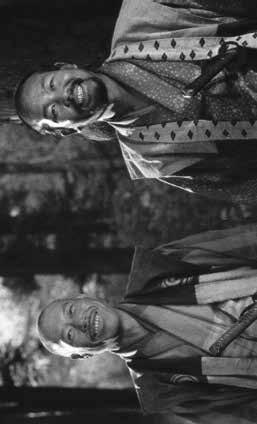

Images from top to bottom: Turning Red , 2022; The Maiden , 2022; Poetry , 2010; Seven Samurai , 1954. The Cinematheque The Cinematheque 1 Open House 12:00 pm Doors 2:00 pm Seven Samurai Free New Restoration 7:00 pm Rio Bravo July Sunday Monday Tuesday Wednesday Thursday Friday Saturday Frames of Mind 14 7:00 pm Love in the Time of Fentanyl Guests Centenary of 15 Armenian Cinema Opening Night 7:00 pm Land of Nairi + White Town Centenary of 16 Armenian Cinema 6:30 pm Song of First Love 8:45 pm Hello, It’s Me Essential Cinema 17 4:00 pm Horus, Prince of the Sun Centenary of Armenian Cinema 6:30 pm The Colour of Pomegranates + Autumn Sun (2006) 8:30 pm Calendar 27 Lee Changdong 11 6:00 pm Peppermint Candy New Canadian Cinema 8:40 pm Cette maison + Vole, vole tristesse + Drei Atlas Lee Changdong 12 7:00 pm Oasis Film Club 18 11:00 am Horus, Prince of the Sun New Restoration 2:30 pm Rio Bravo Centenary of Armenian Cinema 6:30 pm A Piece of Sky 8:20 pm Autumn Sun (1977) Centenary of 19 Armenian Cinema 6:30 pm I’m Going to Change My Name 8:40 pm The Colour of Pomegranates National Indigenous 21 Peoples Day 6:30 pm Remembering Barb Cranmer (1960–2019) + Monkey Beach Free Guests Lee Changdong 20 7:00 pm Secret Sunshine Lee Changdong 26 7:00 pm Poetry New Restorations 3 2:30 pm Rio Bravo 7:00 pm Boat People DIM Cinema 28 7:00 pm On Being and Consciousness New Restoration 29 7:00 pm Rio Bravo Lee Changdong 30 7:00 pm Burning Centenary of 22 Armenian Cinema 6:30 pm The Colour of Pomegranates New Restoration 8:10 pm Boat People Lee Changdong 23 7:00 pm Poetry Lee Changdong 25 6:00 pm Poetry Lee Changdong 2 6:00 pm Burning New Restoration 24 6:30 pm Boat People Lee Changdong 8:50 pm Peppermint Candy New Canadian Cinema 13 6:30 pm Cette maison + Vole, vole tristesse + Drei Atlas Lee Changdong 8:30 pm Green Fish
June 9 (Friday)
June 12 (Monday)
Oasis
오아시스 South Korea 2002
Lee Changdong
134 min. DCP
In Korean with English subtitles
New Restoration
8:30 pm
7:00 pm
June 10 (Saturday) 6:00 pm
June 13 (Tuesday) 8:30 pm
Green Fish 초록물고기
South Korea 1997
Lee Changdong
111 min. DCP
In Korean with English subtitles
“One of the boldest films I’ve ever seen … Lee Changdong is a living master.”
Sean Baker
Oasis stands alone. Lee Changdong’s powerful tale, the final film of his early period, is his most daring demonstration of the uses of melodrama. Jongdu (Sol Kyunggu), fresh out of prison, is his family’s scapegoat. Gongju (Moon Sori), abandoned in an illequipped apartment, is her family’s main source of income, via her disability housing allowance. The two meet by chance. While the able-bodied Jongdu passes as a potentially “productive” member of society, and Gongju, who has cerebral palsy, is dependent on others, Lee’s direction, freely mixing fraught social interactions with realism-puncturing moments of fantasy projection, burns through these assumptions and the boundaries they impose in ways that are harrowing, yet also achingly tender. Social outcast narratives tend to polarize their effects: either pure recuperation or cynical downward spiral. Lee, without ignoring the weighty cost exacted from Jongdu and Gongju, transcends this double bind.
Advisory: Oasis contains a scene of sexual violence.

In Lee Changdong’s tightly wound debut, noirish tendencies manifest in the wake of a Korean male’s mandatory military service. Out of that genre’s long line of saps (think Lancaster in Siodmak’s Criss Cross), Makdong (Han Sukkyu) arrives as a young Rip Van Winkle on the scene, out of time, out of sorts, and out of work in a newly developed area of Seoul. A chance encounter on a train with Miae (Shim Hyejin) gives Makdong a roseate veil through which to perceive the city’s maze; Lee’s own design for the film is the suffocating imposition of order, as Green Fish ’s zero-hero comes to inhabit the masculine shell demanded by the criminal network that wraps its arms around him. Song Kangho, in only his second acting credit, plays a particularly memorable gangster, while the Taiwanese New Wave and Blue Velvet-era David Lynch, with their mixed moods of cruelty and guileless romance, serve as neo-noir muses.

Dragons & Tigers Award
Vancouver International Film Festival 1997
“A forthrightly dark, genre-transcending gangster masterpiece.” Samuel Jamier, Film Comment
Baker
20
“One of the most important living directors. All of his films are worth checking out.”
Sean
Secret Sunshine 밀양
South Korea 2007
Lee Changdong
143 min. Blu-ray
In Korean with English subtitles
“[Jeon’s] performance is, in my mind, the best performance I’ve ever seen in any movie … The filmmaking never turns away from the emotional hurricane of its lead, and I think that’s a really brave choice to make—and a hard one to make.”
Sarah Polley
Lee Changdong’s stature grew to new international heights with Secret Sunshine, winning Jeon Doyeon Best Actress recognition at Cannes and attracting a near-sensational reputation. Its release in South Korea prompted both recommendations and disavowals from evangelical pastors, but Lee’s return to filmmaking after a brief period as South Korea’s Minister of Culture is no work of didacticism. Instead, the trials of Shinae, a single mother who moves to her recently deceased husband’s hometown, are a new configuration of Lee’s interest in melodrama—not for nothing does our heroine describe the experience of her growing involvement in charismatic faith “like being in love.” Secret Sunshine ’s sudden swings in tone from small-town routine to life-shattering tragedy sent some reviewers reaching for the Book of Job as a comparison. What’s striking and most effective about Lee’s film is the way it totally externalizes an emotional life through concrete chains of action and reaction. Song Kangho’s performance as a selfinterested foil is another grounding element in this existential odyssey.
Format note: Secret Sunshine screens from Criterion’s 2011 Blu-ray release, supervised and approved by Lee Changdong and cinematographer Cho Yongkyu
Poetry
South Korea/France 2010
Lee Changdong
140 min. DCP
In Korean with English subtitles
New Restoration
For his fifth film, Lee Changdong sought the inimitable talent of the great Yoon Jeonghee, the studio star of almost three hundred films. Retired since 1994, Yoon returned to the spotlight to play the role of Mija, a retired widow caring for her teenage grandson in a small town. Through her enrollment in a community poetry class and investigation into her grandson’s connection to a local crime, Mija plunges into the past. As in Secret Sunshine, this is a past to which we are mostly denied direct access; however Mija, fully committed to comprehending the way her life intersects with acts of creation and destruction, is a new kind of protagonist in Lee’s cinema: the refiner of judgments in the face of a bleak universe. Cannes awarded Lee for his screenplay, but the film is unthinkable without Yoon, who passed away earlier this year. Her performance is one we can praise unreservedly.


“Spectacular … By the end of [Poetry], Mija’s circumstances have profoundly changed, even as, outwardly, she appears unaltered … It’s a wonder to watch the story shift with each elegantly imparted revelation.”
Keith Uhlich, Time Out
21
시
June 10 (Saturday) 8:20 pm June 20 (Tuesday) 7:00 pm June 23 (Friday) 7:00 pm June 25 (Sunday) 6:00 pm June 26 (Monday) 7:00 pm
June 30 (Friday)
The
7:00 pm
July 2 (Sunday) 6:00 pm
Burning
버닝
South Korea/Japan 2018
Lee Changdong
148 min. DCP
In Korean with English subtitles
“One of the year’s flat-out best films … [Bristles] with an ambiguity derived from the complex, irreconcilable nature of reality itself.”
Adam Nayman, The Ringer
Five years after its release, the mysteries of Burning continue to coil through the memories of those who extol its accomplishments. The film, co-written with Oh Jungmi, a film director and Korean translator of Russian literature, received the most votes of any Lee Changdong film in the 2022 Sight and Sound poll for the greatest film of all time. (It was also selected for our most recent “Best of the Decade” program.) Built around a fatefully connected trio—aspiring novelist Jongsu, promotions gig-worker Haemi, and socialite and self-described “player” of life Ben— Burning ’s tour through the courts, social strata, clubs, streets, and empty landscapes between Gangnam and South Korea’s northern border is, like in Antonioni’s Blow-Up, about as stable as the grain in a photograph. Look closely and you’ll see a murder, a carefully planned disappearance, or just a reflection.

June 6 (Tuesday)
7:00 pm
Golden Delicious
Canada 2022
Jason Karman
119 min. DCP
In Person: Jason Karman

The feature debut of Vancouver-based director Jason Karman is a classic coming-of-age drama set in the digital age. Everyone wants something from high-school senior Jake (Cardi Wong): his father is pushing him to try out for the basketball team—an abandoned dream of his own—and his girlfriend wants to take their relationship to the next level. But it’s not until Aleks (Chris Carson), an openly gay teen with a love for basketball, moves in across the street that Jake begins to struggle with his own desires.
“Working with the youth, I have seen how social media puts enormous pressure on young minds. We are exposed to a confusing world that often defends toxic behaviour and celebrates questionable role models. Additionally, one has cultural elements like ‘saving face’ that one must deal with. ‘Saving face’ is a strategy to avoid humiliation or embarrassment as a method of survival and a core social value in Asian culture; sexuality is often hidden to ‘save face.’ This film continues my exploration of how social media perspectives can connect us but also amplify emotions and alienate us. Golden Delicious shows that kids of immigrant families can manage this and, in the end, become stronger.” —Jason
Karman
Best Canadian Feature Film, Best Overall Film (People’s Choice)
Vancouver Asian Film Festival 2022
Director Jason Karman will participate in a post-screening Q&A hosted by the KFFC
22
Cinematheque and the 10th Korean Film Festival Canada present
Moving Mountains The Centenary of Armenian Cinema
Co-presented with the Armenian Cultural Association of British Columbia and the National Cinema Center of Armenia
April 16, 2023, marked the centenary of the Armenian film industry, originally established in the Soviet Republic of Armenia, on the basis of one nationalized movie theatre and a miniscule budget of 60 rubles. Less than two years later, the first Armenian film production, the documentary feature Soviet Armenia, was released across the USSR, setting course for one of the most multifaceted and complex cinematic legacies in the Near East.
Though modest in scale, the output of the Armenian film industry boasts a number of internationally recognized works whose impact and importance extends far beyond the confines of Armenian culture. Aside from globally revered masterpieces by the likes of Sergei Parajanov and Artavazd Peleshyan, Armenian films also served as an important early platform for some of the first realistic, anti-colonial depictions of Middle Eastern nations.
Following Armenia’s independence in 1991, the local film industry faced long periods of economic instability and artistic uncertainty that were compounded by wartime conditions, the rise of conservative mores, and mass-scale migration. Despite these factors and the lack of the centralized production and distribution mechanism that supported filmmakers during the Soviet era, independence-era directors have developed various strategies to bring Armenian themes and voices back to the cinema screen. Working in a conflict-ridden environment, these new generations of filmmakers have bravely attempted to break new ground in the Armenian cultural space by addressing controversial topics and adopting hybrid visual sensibilities that are entirely novel for the Armenian screen.
Collectively, the narratives and issues touched upon by Armenian filmmakers address key problems that have defined the development of human civilization throughout modernity. The relevance of these perspectives is particularly tangible and fresh today, since they address universal subjects, such as global wars, genocide, colonialism, class oppression, cultural identity, gentrification, and women’s rights, from a peripheral position where Western and Eastern cultural paradigms meet, clash, and often interlope.
Comprising eight feature-length films and two shorts, “Moving Mountains” is the first Canadian retrospective survey of Armenian cinema’s volatile trajectory from the ideologically oriented silent period to the post-Soviet era of creative diversity and experimentation. Featuring works by major figureheads such as Hamo Beknazaryan, Sergei Parajanov, Frunze Dovlatyan, and Henrik Malyan, the program also indicates the dramatic shifts in local cinematic traditions, which have been radically transformed and expanded through the active participation of women and diasporan filmmakers since the early 1990s.
Vigen Galstyan, Series Curator
Head of Film Heritage Department

National Cinema Center of Armenia
Acknowledgements: The Cinematheque is grateful to Arto Tavukciyan, Armenian Cultural Association of British Columbia, and Vigen Galstyan, National Cinema Center of Armenia, for making this series possible.
Film notes written by Vigen Galstyan
The Armenian Cultural Association of British Columbia is a non-profit organization that strives to preserve and promote the heritage and culture of the Armenian people, and to foster a wider appreciation of Armenian history, traditions, and values.
National Cinema Center of Armenia is a state funding body that supports the Armenian film industry at key stages of film production. It also aims to contribute to the promotion of Armenian cinema and to foster new artistic accomplishments and acknowledgement of Armenian filmmakers worldwide.
23
June 15–22
June 15 (Thursday) Opening Night
7:00 pm preceded by
Land of Nairi
USSR 1930
Hamo Beknazaryan
56 min. DCP
Silent. Russian intertitles with English subtitles
New Restoration
Hamo Beknazaryan is a figurehead of Armenian cinema and the author of the maiden Armenian fiction film, Namus (1926). Dedicated to the 10th anniversary of Armenia’s Sovietization, Land of Nairi, Beknazaryan’s first feature documentary, is a vast historical panorama of Armenia’s transition from a Russian colony to a Soviet Republic. Admitting to total indifference towards the documentary format, Beknazaryan approached his subject like a dramatic tale in which the central character is the country itself rendered through a poetic, and, at times, surreal lens. Composed entirely of archival footage, appropriated and staged scenes, this meta-narrative results in graphically powerful, poster-like images that form a propagandistic pamphlet about the evils of capitalism and the “triumph” of Stalin’s collectivization policies. For Beknazaryan, this ideological axis served as an excuse to create an entirely modern cinematic language that strives toward the visceral power of music. Widely screened in diasporic Armenian communities in the 1930s, Land of Nairi was forgotten soon after. This new restoration features a musical score by Vahagn Hayrapetyan commissioned by the Armenian Cultural Association of British Columbia.
White Town
USSR 1988
Harutyun Khachatryan
36 min. DCP
In Armenian with English subtitles
Documentary has been a stronghold of Armenian cinema, attaining global influence through the work of its undisputed maverick, Artavazd Peleshian. During the 1980s, a number of new filmmakers started to apply Peleshian’s techniques of associative visual montage to more politically inclined aims. Harutyun Khachatryan was among this group of renegades who made a splash on the international scene with Kond (1987), his provocative “exposé” of Yerevan’s hidden shanty-town. He followed this with the more subtle, albeit no less radical, White Town, a largely wordless and aloof study of the director’s birthplace, the city of Akhalkalaki in the south of Georgia. Recalling Frederick Wiseman’s observational methodology, the documentary operates like an anthropological survey of the customs, rituals, and routines of this ancient town’s predominantly Armenian population.

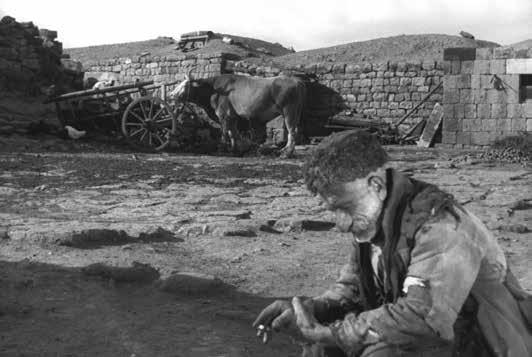
24
Երկիր Նաիրի
Սպիտակ քաղաք
June 16 (Friday) 6:30 pm
Song of First Love
USSR 1958
Yuri Yerznkyan
109 min. DCP
In Armenian with English subtitles
Following a decade-long inertia under Joseph Stalin’s autocratic control of the film industry, Soviet cinema bounced back with a fervent optimism towards the new horizons offered by modernization and greater contact with the outside world. Yuri Yerznkyan’s Song of First Love belongs to a slate of films made by the post-war generation of filmmakers who wanted to address issues pertaining to youth and the challenges of contemporary urban life. The storyline charts the rise, fall, and eventual comeback of a popular singer, who gives into the temptations of fame only to realize the value of familial bonds. Replete with rousing pop ballads that have since entered the pantheon of Armenian music, Song of First Love was Armenia’s first international cinematic hit and one of the highest-grossing Soviet movies of the 1950s. Redolent of Douglas Sirk’s melodramas, the film cleverly masks its politically sensitive concerns about the clash of traditions and modernity under a parable on romantic love—a model that would be replicated by numerous later Armenian films.

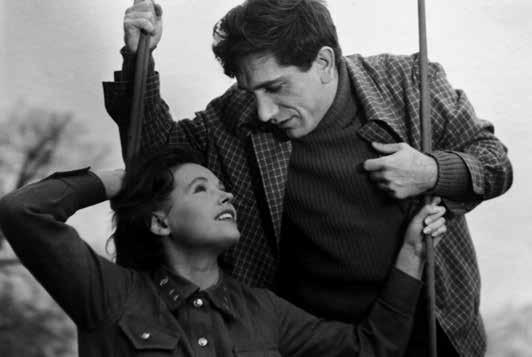
Hello, It’s Me
USSR 1965
Frunze Dovlatyan
137 min. DCP
In Armenian and Russian with English subtitles
New Restoration
Frunze Dovlatyan’s third feature film and first made in his home country, Hello, It’s Me is a cinematic harbinger of the modernist turn in Armenian visual culture. Unabashedly experimental, this sprawling tale of lost love and post-war ennui projects a boldly intellectual vision, which led to its selection for the official competition of the Cannes Film Festival in 1966. A fictionalized biopic of the great Armenian physicist Artem Alikhanyan, the film tells the story of a talented young scientist who looks back at the difficult choices and personal loses he experienced in order to realize a seemingly impossible dream of building an internationally renowned space-ray research centre on Aragats, Armenia’s highest mountain. Aided by Albert Yavuryan’s flowing widescreen cinematography and Martin Vardazaryan’s melancholic jazz score, the film captures the anxious spirit of the 1960s and raises issues pertaining to Armenia’s traumatic past.
25
Բարև
եմ
, ես
June 16 (Friday) 8:45 pm
Առաջին սիրո երգը
“Hello, It’s Me received attention thanks to its Cannes selection … Using memory as its key element, this is a drama designed to awaken the nation’s consciousness: says the hero, ‘recollections are not burdens, but hunger for the past.’”
Siranush Galstyan, Il Cinema Ritrovato
June 17 (Saturday) 6:30 pm
June 19 (Monday) 8:40 pm
June 22 (Thursday) 6:30 pm
preceded by (June 17 only)
June 17 (Saturday) 8:30 pm
The Colour of Pomegranates
(aka Sayat Nova)
Նռան գույնը
USSR 1969
Sergei Parajanov
78 min. DCP
In Armenian with English subtitles
While the Tbilisi-born, Kyiv-based Sergei Parajanov only made one feature and one short film in Armenia, his seminal masterpiece The Colour of Pomegranates has come to inextricably define international perceptions of Armenian “national” cinema. Commissioned by the state studio, Hayfilm, to make a biopic of the great 18th-century Armenian ashugh (troubadour) Sayat Nova, Parajanov turned the task on its head, reinventing the genre as a psychological dreamscape rendered through a surreal inversion of medieval Armenian art, architecture, and music. This non-linear and purely associative approach was an extreme example of 1960s Soviet “poetic cinema.” Combined with the heavy emphasis on traditional religious iconography and erotic symbolism, the director's creative anarchism led to accusations of homosexuality and nationalist propaganda, resulting in the film’s recutting and Parajanov’s subsequent imprisonment. Despite this, The Colour of Pomegranates began to circulate on the international festival scene, inspiring major filmmakers like Federico Fellini, Mohsen Makhmalbaf, and, most recently, Ari Aster.

Autumn Sun
Armenia 2006

Diana Kardumyan
8 min. DCP
In Armenian with English subtitles
A ballerina, returning home from her dance academy, feels that a young man is following her through the hot summer streets of Yerevan. Or perhaps this is just her imagination? Based on a short story by Tonino Guerra, Diana Kardumyan’s second short film is a poetic ode to lost youth and the ambiguous nature of desire. Kardumyan became one of the first women filmmakers to stand at the forefront of Armenian cinema’s slow recovery in the 2000s, after years of stagnation. Her impressionistic aesthetic exemplified a sensual and fluid sensibility that brought an entirely new perspective to local filmmaking trajectories, in which women directors had only a fractional presence previously.
Calendar
Օրացույց
Canada/Armenia/Germany 1993
Atom Egoyan
74 min. DCP
In English and Armenian with English subtitles
Armenia’s breakaway from the USSR in 1991 had cataclysmic consequences for the country’s film industry. Practically grounded to a halt due to the collapse of production and distribution systems, the sector nevertheless was presented with other avenues of development. Most significant among these was the increased involvement of diasporic filmmakers, who had an unprecedented opportunity to shoot films in their historical homeland. One of the first to respond was rising Canadian Armenian auteur Atom Egoyan, who travelled to Armenia in 1992 with his creative and life partner Arsinée Khanjian to make the largely improvised, low-budget Calendar. Starring the couple themselves, the ambivalent and elliptical narrative follows a diasporan photographer and his wife, whose travels across Armenia’s ancient landscape expose different worldviews and connections, leading to the eventual breakdown of their relationship. Egoyan’s minimalist interpolation of chamber drama and faux home video footage is an incisive deconstruction of the conflicts inherent in globalized cultural identity, and a marker of Armenian cinema’s evolution beyond the geopolitical confines of Soviet legacy.

26
Աշնան
արև
“An extraordinary film … Parajanov’s compositions are astonishing, and no one has ever made the olive-and-orange tones of Soviet colour stock look better … Sublime and heart-breaking.”
J. Hoberman, Village Voice, on The Colour of Pomegranates
A Piece of Sky
(aka A Slap in the Face) Կտոր
USSR 1980
Henrik Malyan
80 min. DCP
In Armenian with English subtitles
Henrik Malyan belongs to a generation of directors whose films came to typify the post-war New Wave of the Armenian screen. Made from a critical and contemplative perspective, Malyan’s work furtively foregrounds issues of oppression and resistance in the context of Soviet cultural hegemony through a nuanced combination of linguistic games and methodically composed miseen-scène. The elliptical, irony-infused tone of his early work gave way to more classically structured approaches in later productions, such as his immensely popular adaptation of Vahan Totovents’s biting social satire, A Piece of Sky. Set in a small, turn-of-the-century Armenian town, the film follows Torik, a naive, socially inept orphan who is adopted by his childless relatives and forced into the craft of donkey saddlemaking. When his mother fails to find him a prospective bride, Torik falls in love and marries a visiting sex worker, sparking the ire and scorn of the townsfolk.
Autumn Sun
արև USSR 1977
Bagrat Hovhannisyan

80 min. DCP
In Armenian with English subtitles
Despite its initial feminist inclinations, Soviet Armenian cinema remained a realm of male-dominated narratives and visions that rarely put women in the driver seat. The second feature by Andrei Tarkovsky’s one-time assistant, Bagrat Hovhannisyan, was a singular exception where the heroine not only speaks her mind, but methodically exposes the barbarity of the world constructed by men. Based on an autobiographical novella by the screenwriter Hrant Matevosyan, Autumn Sun follows a day in the life of Aghun, an acerbic matriarch in a tiny mountain village who prepares to visit her eldest son and his bride in the capital. Throughout the film, Aghun unleashes her exasperation at anyone who crosses her path, while ruminating on her struggles to survive, build a home, and make something of herself despite a loveless marriage and the stifling parochialism of rural community. A director of rare sensitivity, Hovhannisyan imbues this minor episode with the breadth of a Chekhovian tragedy about broken dreams, the imprisoning obligations of family life, and, ultimately, the central role of women as custodians of social relations.
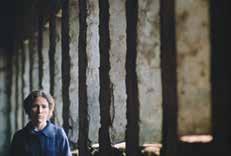
I’m Going to Change My Name
Maria Sahakyan
103 min. DCP
In Armenian and Russian with English subtitles
Inspired by the traditional Armenian sharakan, a nine-part religious chant, I’m Going to Change My Name was Maria Sahakyan’s third and final feature film before the director’s untimely death at 37 from cancer. The film’s loose story revolves around the introverted 14-yearold Evridika, who lives in the northern Armenian industrial city of Alaverdi with her distracted mother. Plagued by boredom, burgeoning sexuality, desires for escape, and a longing for her absent father, Evridika drifts across the virtual world of internet chat rooms and the alienating landscape of her town. When her mother’s former lover suddenly reappears, the girl makes an emotional connection that pushes her out of her dream world and into the dangerous realm of adulthood. Developing the lyrical vision she exhibited in her 2005 debut feature The Lighthouse, Sahakyan’s last film is built out of ethereal shards of adolescent love and psychology, luminously photographed by the rising star of Armenian cinematography, Mkrtich Malkhasyan.

27
մը երկինք
Աշնան
Այդ ես չեմ
(aka Alaverdi)
Armenia/Germany/Russia 2012
June 18 (Sunday) 6:30 pm June 18 (Sunday) 8:20 pm June 19 (Monday) 6:30 pm
Ongoing Series
Frames of Mind
A mental health film series.
May 17 (Wednesday) 7:00 pm
The Cinematheque is pleased to join with the Institute of Mental Health, UBC Department of Psychiatry, in presenting Frames of Mind, a monthly event utilizing film to promote professional and community education on issues pertaining to mental health and illness. Screenings are accompanied by presentations and audience discussions.
Series directed by Dr. Harry Karlinsky, Clinical Professor, Department of Psychiatry, University of British Columbia
Programmed by Caroline Coutts, film curator, filmmaker, and programmer of Frames of Mind since its inception in September 2002
June 14 (Wednesday) 7:00 pm
Selvportrett (Self Portrait)
Norway 2020
Margreth Olin, Katja Hogset, Espen Wallin 77 min. DCP
In Norwegian with English subtitles
Vancouver Premiere
Lene Marie Fossen’s self-portraits will break your heart. Beautifully composed and artfully presented, they are nevertheless photographs of a young woman in the throes of a long and drawn-out process of self-starvation. An overly anxious child, Lene Marie stopped eating at the age of ten; she was diagnosed with anorexia soon after and hospitalized off and on for years. Now 28, Lene Marie has never gone through puberty. Her pain is ever-present, but she has discovered a passion (and a great talent) for photography. When her work is lauded by Norway’s best-known photographer—resulting in an exhibition at a preeminent photography festival—an international breakthrough seems imminent. But a car accident leaves her unable to use her camera, and Lene Marie falls into a crushing depression. In October 2019, at only 33, Lene Marie passed away. She watched the finished film before she died and, together with her parents, wished for it to be released into the world
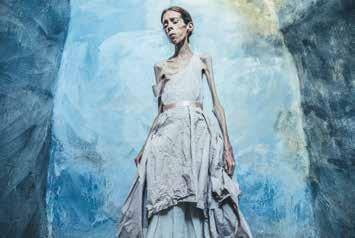
Post-screening discussion with Dr. Seena Grewal, a child and adolescent psychiatrist and the senior psychiatric director of the Provincial Eating Disorder Program at BC Children’s Hospital.
Dr. Grewal’s clinical work has focused on eating disorders in children and adolescents as well as acute care/crisis interventions for youth.
Moderated by Dr. Harry Karlinsky
Love in the Time of Fentanyl
Canada 2022
Colin Askey
80 min. DCP
A public health emergency around what came to be known as “the overdose crisis” was first declared in this province in April 2016— the same year the grass-roots Overdose Prevention Society began offering its harm reduction services. In the intervening seven years, a staggering 11,171 deaths in BC have been attributed to this ongoing crisis. Supporters of OPS are convinced this number would be much higher if not for their frontline efforts. Having moved from their first location, a tent, to their current space on East Hastings Street, OPS provides a safe, warm, non-judgmental drop-in where people can test their drugs, pick up clean needles, and inject in safety, as well as access other services. A veteran of ten years work in the DTES, director Askey is known and trusted. Using a fly-on-the-wall observational approach, his film portrays both the community members who work at OPS (most either current or former drug users) with the same clear-eyed compassion as those who use its services.
Post-screening discussion with Sarah Blyth and Amy Evans
Sarah Blyth is the executive director and co-founder of Vancouver’s Overdose Prevention Society and former Vancouver Park Board commissioner. She is a long-time community activist who has been working in the Downtown Eastside for over a decade providing grassroots services, opportunities, and responses to the overdose crisis.
Amy Evans is a manager at Vancouver’s Overdose Prevention Society with five years recovery. She found her passion doing harm reduction work in the Downtown Eastside neighbourhood.
Moderated by Dr. Harry Karlinsky
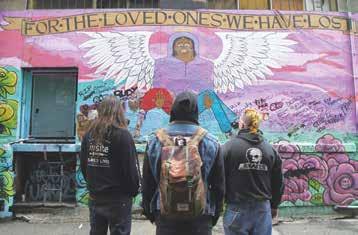
28
Ongoing Series
DIM Cinema
Moving-image art in dialogue with cinema.
Curated by Michèle Smith
Nature (La nature)
France/Germany/Armenia 2019
Artavazd Peleshian
62 min. DCP
No dialogue
Canadian Premiere
“In Eisenstein every element means something. For me the individual fragments don’t mean anything anymore. Only the whole film has the meaning.”
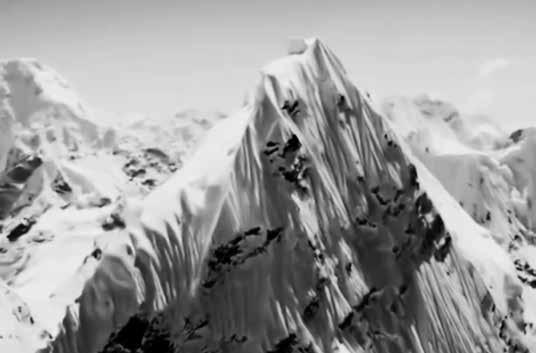
Artavazd Peleshian, 1998
Born in Armenia in 1938 and trained at VGIK in the 1960s, Artavazd Peleshian has lived through the entire postwar Soviet period and its aftermath. Revered by filmmakers as an authentic genius of the seventh art and referenced in its histories as a “missing link” connecting the legacy of Soviet montage with more modern uses of the technique, Peleshian rests his reputation on 12 short films made between 1964 and 1993. Across these films, Peleshian employs an innovative contrapuntal approach to montage in which visual and aural sequences recur in different contexts and variations, spiralling back and forth, to create a “magnetic field around the film.” His filmography was considered complete until, to the surprise of many, he released a new film in 2019, made entirely from material retrieved online that he reworked in his signature style. The result is a relentless montage of a world in flux, whose inhabitants are no match against the elemental forces of nature.
DIM Cinema is a monthly series that presents Canadian and international moving-image art in dialogue with cinema. The series was initiated in 2008 by local curator Amy Kazymerchyk to draw attention to artists and experimental filmmakers whose practices engage with cinema as a medium, social context, formal structure, or architectural space. The name of the series is inspired by the diffused Vancouver sky, the darkness of the cinema, and a quote from James Broughton’s Making Light of It (1992): “Movie images are dim reflections of the beauty and ferocity in mankind.” DIM Cinema has been curated by Michèle Smith since 2014.
An Experiment in Leisure
Belgium 2016
Manon de Boer
36 min. DCP
In Dutch, English, and French with English subtitles
Becoming Plant
United Kingdom/Norway/ Denmark 2022

Grace Ndiritu
49 min. DCP
On Being and Consciousness
Open your ears, steady your gaze, relax your body, and free your mind as Manon de Boer guides us through a meditation on creativity. Four artists—a dancer, a performance artist, a musician, and an actor—ponder extracts from psychoanalyst Marion Milner’s An Experiment in Leisure (1937) and On Not Being Able to Paint (1950). There’s a Norwegian seascape to contemplate; its soundwaves penetrate the artists’ workspaces, inducing a state of mental flow somewhere between presence and absence. In Grace Ndiritu’s Becoming Plant, six dancers participate in a therapeutic group experiment with psychedelics in a demilitarized industrial complex. Once the infused psilocybin kicks in, clothes shed like pupa and emerging bodies stretch and twist organically into a choreographed exploration of the site, their movements reflecting the themes of psychiatrist Birgit Bundensen’s voiceover: neuroscience, communication, mental health, commodification, capitalism, labour, communitarianism, spirituality, healing, happiness, and alternative ways of being in the world.
"Ndiritu's work both provokes and entertains … Becoming Plant [is] directed with an innovative understanding of film form."
Jury citation for the Film London Jarman Award

29
May 31 (Wednesday) 7:00 pm June 28 (Wednesday)
7:00 pm
The Image Before Us: A History of Film in British Columbia— The Finale
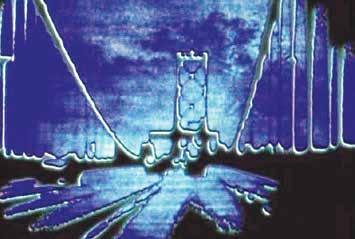
 Curated by Harry Killas
Curated by Harry Killas
This is our seventh and final season of “The Image Before Us.” We are calling this season “The Finale” to put an exclamation point on the series. In it, we will rescreen many of the most memorable and significant films from the first six seasons. To answer the question, “What is the image or what are the images before us?,” we need the opportunity to actually see them, to show films— our films, our films from our community—that are hard to see, except at an institution like The Cinematheque. While we had never intended for this series to go past a single year, it has become a modest contribution to community building, perhaps nation building, as our culture and community here in British Columbia continues to evolve, define itself, and reflect itself through film and media, to ourselves and to others. —Harry Killas
Harry Killas is a Vancouver filmmaker and associate professor in Film + Screen Arts at Emily Carr University of Art + Design.
Acknowledgement: Harry Killas is grateful to Colin Browne for his curatorial assistance on this season of “The Image Before Us.”


This season of “The Image Before Us” concludes in our July–August program.
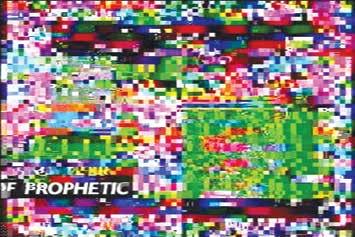
“Before there was the so-called Vancouver School of photo-conceptual art, there was the Vancouver-based and internationally recognized experimental film scene. Here is a selection of classics and new works to experience, meditate on, and enjoy, guest curated by one of our very finest experimental film artists, Richard Martin.”
Harry Killas
May 24 (Wednesday) 6:30 pm
From Milltown to Metropolis: Vancouver Experimental Film


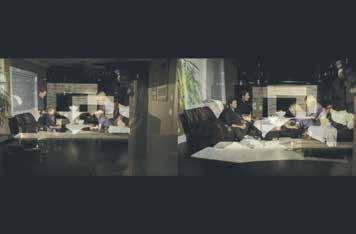
Curated by Richard Martin
Experimental filmmaking played a significant part in Vancouver’s art scene of the 1970s. It was an important moment in the history of visual culture and film art in BC, marked by outrageous innovation, unbridled experimentation, and outright subversion. This movement flourished for many years, and was dialled into an international discourse, thanks to a visionary and colourful collection of artists, curators, and institutions. —Richard Martin
98.3 KHz: Bridge at Electrical Storm
Canada 1973. Al Razutis. 11 min. 16mm to 2K digital
Narrows Inlet
Canada 1980. David Rimmer. 10 min. 16mm
Limited Engagement
Canada 1976. Tom Braidwood. 7 min. 16mm to 2K digital
Current
Canada 1986. Ellie Epp. 3 min. 16mm to digital
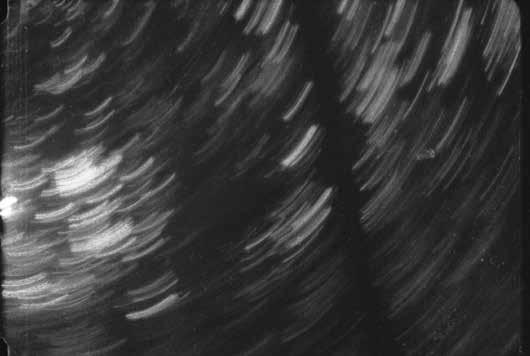
Spare Parts
Canada 1975. Peter Lipskis. 10 min. 16mm to 2K digital
Mixed Signals
Canada 2005. Richard Martin. 8 min. Digital
ABCAM
Canada 2016. Richard Martin. 8 min. Digital
i see me watching
Canada 2022. Sidney Gordon. 8 min. 16mm to digital
Asphyxia
Canada 2022. Celina de Leon. 1 min. 16mm to digital
Surfacing on the Thames
Canada 1970. David Rimmer. 9 min. 16mm to 2K digital
Total running time: 75 min.
Introduced by Richard Martin
Richard Martin is an award-winning Vancouver filmmaker whose work encompasses experimental film and video as well as mainstream feature film and television. His 2014 documentary BackBone: Vancouver Experimental Cinema 1968–1981 previously screened in this series.
31
May 24 (Wednesday) 8:30 pm preceded by
Mighty Jerome
Canada 2010
Charles Officer
80 min. DCP
“Thoughtfully provocative … A smartly constructed, visually exciting doc.”
Ken Eisner, Georgia Straight
The rise, fall, and redemption of Black Canadian track legend Harry Jerome (1940–1982), a kid from North Vancouver who became the fastest man on the planet, is recounted in this artful documentary directed by noted Jamaican Canadian filmmaker Charles Officer (Nurse.Fighter.Boy, Unarmed Verses). The film, shot in gorgeous black and white, employs archival footage, personal interviews, stylized re-enactments, and period music to tell Jerome’s remarkable story; it also examines how issues of race and the era’s civil rights movement played out in Jerome’s sometimes turbulent life. Vancouver-based Trinidadian Canadian filmmaker Selwyn Jacob (The Road Taken), whose projects often explore the experiences of Black Canadians, was producer.
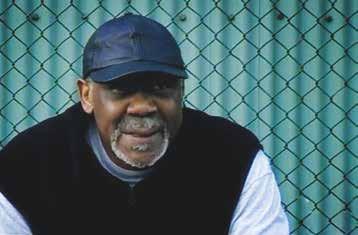

Hardwood
Canada 2005
Hubert Davis
29 min. DCP
In this moving, Oscar-nominated documentary short, filmmaker Davis, the mixed-race son of a Vancouver woman and a Harlem Globetrotters basketball player, examines the complicated personal decisions made by his father that affected families in two countries
32
“Two excellent films that address the Black experience in the Canadian and British Columbian sports world. Both contribute significantly to that elusive genre: ‘creative documentary.’”
Harry Killas
Spotlight on First Features
Double Happiness
Canada 1994
Mina Shum
87 min. DCP
In English and Cantonese with English subtitles
Vancouver filmmaker Mina Shum’s seriocomic, semiautobiographical debut feature was one of the most talked about Canadian films of the 1990s. Future Grey’s Anatomy and Killing Eve star Sandra Oh, here still an up-and-comer, has the lead in Shum’s spirited tale of a young Chinese Canadian woman torn between her own wants and needs and the expectations of her more traditional parents. Oh plays Jade, an aspiring actress still living at home. To keep the peace, she agrees to let her parents set her up with a nice Chinese boy, but soon finds herself falling for Mark (Callum Keith Rennie, also in an early role), a non-Asian grad student. Oh won a Genie for her infectious performance.
“Nominated for seven Genies, Mina Shum’s first feature shone a spotlight on Sandra Oh, star in the making, as well as on the director-writer. A deft coming of age story with both humour and heart.”
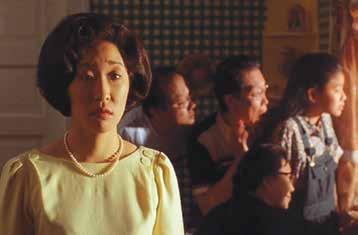
Harry Killas
On the Corner
Canada 2003
Nathaniel Geary
95 min. 35mm
“Tough-minded yet compassionate, hard-edged yet sensitive, One the Corner is a salient British Columbia film of social engagement, with a message that resonates and reverberates to this day. A rare opportunity to connect or reconnect with this powerful and astonishing debut feature on the big screen. That the talented and passionate Nathanial Geary was never given the chance to make another feature is an unfortunate indictment of the filmmaking contexts in our country.”
Harry Killas
Nathaniel Geary’s assured feature is a tough, tender tale of life on the streets of Vancouver’s Downtown Eastside. The director’s award-winning 1998 short Keys to Kingdoms dealt with the same troubled neighbourhood; Geary also worked for several years at the DTES’s Portland Hotel. Teenage runaway Randy (Simon Baker) arrives in Vancouver looking for his older sister Angel (Alex Rice). He finds her at the Pennsylvania Hotel, addicted to heroin and involved in sex work. Angel urges Randy to return home to their reservation in Prince Rupert, but drugs—and Angel’s best friend Stacey (Katherine Isabelle)—prove too alluring. Named Best Western Canadian Feature at VIFF 2003.
50% of ticket proceeds from this screening will benefit the PHS Community Services Society
PHS Community Services Society provides housing, healthcare, harm reduction, and health promotion for some of the most vulnerable and under-served people in Vancouver’s Downtown Eastside and Victoria.

33
6:30
June
June 7 (Wednesday)
pm
7 (Wednesday) 8:30 pm
National Indigenous Peoples Day Indigenous Women in Film
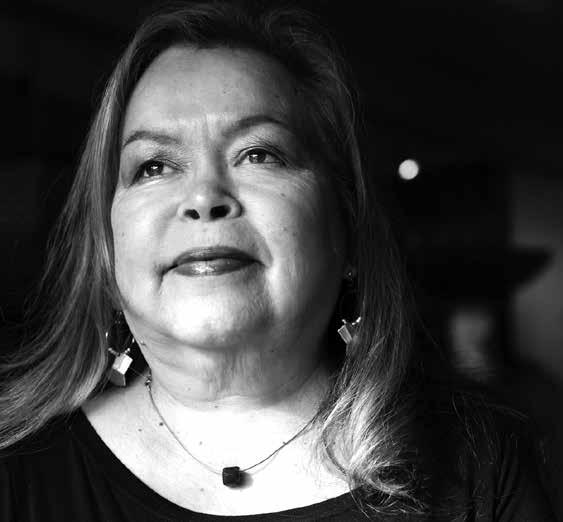
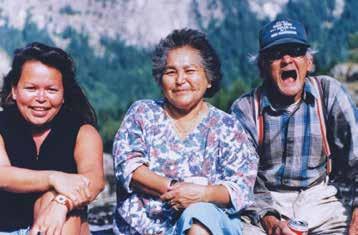
June 21 (Wednesday) Free Admission 6:30 pm
Barb Cranmer & Loretta Todd
Remembering Barb Cranmer (1960–2019)
“The inspiration for my work comes from our own people’s rich history. I am a messenger of these stories and have been entrusted to bring them to a wider audience. The telling of our stories from our perspective and giving voice to our communities is critical. I feel fortunate to be able to live the history of our people through the documentaries I make.”
—Barb Cranmer
Ƚaxwesa Wa—Strength of the River
Canada 1995
Barb Cranmer
54 min. DCP
In English and Kwak’wala with English subtitles
As distinct fishing societies of great spiritual, cultural, and economic wealth, Indigenous peoples have always respected the resources of their rivers and oceans. But within their own lifetime, they have watched governments “manage” the fishery into a state of crisis. Filmmaker Barb Cranmer, a member of the ‘Na_mg_is First Nation, explores the rich fishing traditions of the Sto:lo, Heiltsuk, and ‘Na_mg_is peoples of Canada’s West Coast in Ƚ axwesa Wa — Strength of the River. With over fifteen years’ experience fishing Johnstone Strait with her father, Cranmer presents rarely heard stories of traditional fishing practices and documents Indigenous peoples’ efforts to build a sustainable fishery for the future. —NFB
“[Cranmer’s] films document the texture of life as it is lived today— of weaving, carving, song, dance, fishing, and the Potlatch—and are informed by cultural and political self-determination.”
University of Chicago Film Studies Center
Please note: Unclaimed tickets for complimentary screenings at The Cinematheque will be released 15 minutes before showtime. Please arrive early to guarantee your seat
34
Shaun Lang, Hollywood North Magazine
followed by
‘Namegan’s Om Dlu’wans Awinagwisex— We Are One with the Land
Canada 2009
Barb Cranmer
32 min. DVD
In English and Kwak’wala with English subtitles
“Barb Cranmer was one of the most prolific and awarded Indigenous documentary filmmakers of her generation. Her films resonate today with their themes of self-reliance, beneficial transformation, optimism, cultural legacy, and human dignity.”
Harry Killas
Comprising a network of lands, rivers, waters, and islands in the northern region of Vancouver Island, the ancestral territory of the ‘Na_mg_is First Nation has sustained and defined its people, in their spirit, song, and dance, for thousands of years. The existential bond between this place and its stewards is celebrated in Cranmer’s empowering short documentary.
Guests: producer Cari Green, filmmaker Loretta Todd
Cari Green has been producing award-winning social issue documentary films for over thirty-five years, with leading filmmakers including Loretta Todd and the late Barb Cranmer. Her productions have screened at Sundance, IDFA, Hot Docs, and TIFF, among others. She has served on the board of the Hot Docs Film Festival, was co-chair of DOC BC, received the 2013 Mayor’s Arts Award for Film & Media, and is an honorary lifetime member of Women in Film and Television.
Loretta Todd (Cree/Métis) is an acclaimed filmmaker and visionary leader in Indigenous media. She has directed dozens of documentaries, including the Genie-nominated Forgotten Warriors (2007); produced and showrun award-winning series for children and youth; and created apps, installations, digital media, games, and animation. She is the founder and creative director of IM4 Media Lab, an Indigenous XR lab, and a fellow of the Indigenous Screen Office. Her many accolades include a Rockefeller Fellowship, participation in the Sundance Screenwriters Lab, and a lifetime achievement award from imagineNATIVE. She made her fiction feature debut with Monkey Beach (2020).
Monkey Beach
Canada 2020
Loretta Todd
103 min. DCP
Based on the iconic novel by Haisla/Heiltsuk author Eden Robinson, the first narrative feature from Cree/Métis filmmaker Loretta Todd opened VIFF 2020 and swept the American Indian Film Festival awards, winning best picture, director, and all four acting prizes. A supernatural story rooted in spiritual tradition and the territory it is set (and shot) on—Kitamaat, BC— Monkey Beach follows a Haisla woman (Grace Dove), tormented by visions of dark fates and dead loved ones, as she returns to her Kitamaat community after two self-destructive years in Vancouver. Reunited with her family, she must reckon with her past and uncanny gifts, and save her kid brother (Trickster ’s Joel Ouellette), lost at sea. Despite the myriad drawbacks of a shoestring budget (frustrations the director has been frank about), Todd delivers a potent, intergenerational tale of cultural empowerment, familial bonds, and the porousness between realms mystical and material.
“The debut dramatic feature of veteran filmmaker and media artist Loretta Todd, one of the first Indigenous women to pursue film studies at Vancouver’s Simon Fraser University.”
 Harry Killas
Harry Killas
Introduced by director Loretta Todd
35
“If The Grizzlies was the Inuit answer to the sports drama, then Monkey Beach is the Haisla response to the superhero genre. That’s about the closest I can come to categorizing what is truly a spiritually healing experience whether you’re Haisla or otherwise.”
Ongoing Series Film Club
Free popcorn and Film Club badge for junior cinephiles (ages 13 and under). Discounted ticket price ($6) too!
Film Club is a movie matinée series for kids and their families, an early introduction to cinema as a public artform, and a way to connect young artists and art appreciators to a centuryplus tradition of grappling with the power of the imagination. By way of carefully selected titles, balancing classics and new works, our programming team extends a welcome to the next generation of cinemagoers—and anyone who wants to revisit a treasured favourite.
May 21 (Sunday)
11:00 am
June 18 (Sunday)
Turning Red
USA 2022
Domee Shi
100 min. DCP
Vancouver Theatrical Premiere
The North American theatrical release of Domee Shi’s Oscarnominated debut feature, a pop-tween fantasy that, in true Pixar fashion, melds car chases, emotional disequilibrium, and more than a glint of nostalgia, was shuttered at the eleventh hour last year. We’re rectifying this move with our May edition of Film Club! edition of Film Club! In turn-of-the-millennium Toronto, Meilin Lee (Rosalie Chiang) follows an A-student routine, at least until the unruliest pages of her romantic imagination and cultural inheritance manifest in the form of an overnight red-panda body shift. Myths of transfiguration are among the most enduring and evocative in any culture, and Shi’s spin on the form is exuberant like few other films from the Silicon Valley studio—undoubtedly the first one to have Nichijou and Fruits Basket as animation touchstones! Sandra Oh (Double Happiness) and Orion Lee (First Cow) lend their voices as Meilin’s parents.

Additional Turning Red screening!
May 20 (Saturday) 4:00 pm
Regular pricing in effect— but Film Club members (ages 13 and under) can still get a free kid-sized popcorn by showing their Film Club badge!
The May 21 screening of Turning Red will be preceded by Barely Squeaking By, a short film created by Momoko and Peter during the Learning & Outreach 2022 Cinelab summer filmmaking camp for youth aged 14–19.
Horus, Prince of the Sun
(aka Little Norse Prince Valiant)
太陽の王子 ホルスの大冒険
Japan 1968
Takahata Isao
82 min. Blu-ray

English-dubbed version
11:00 am
The early works of Studio Ghibli co-founder Takahata Isao— comprising numerous TV episodes and three feature films—are often underrated in his career. For this month’s Film Club, we’re presenting the first of those features, an adventure tale that displays Takahata’s talent as a director of flowing action and precise psychology. Young hero Horus, fearsome villain Grunwald, and gifted, troubled Hilda all converge on a rural, self-sustaining village. Takahata was apparently inspired by the grand scale of Eisenstein’s Alexander Nevsky, as well as the film he’d apprenticed on five years prior, The Little Prince and the Eight-Headed Dragon. That film provided a mythic template; but the ambitious balance between human conflict and the indifferent beauty of the natural world sets Takahata’s debut apart. Takahata and Miyazaki Hayao crossed paths as animators for the first time in production on Horus.
Advisory: Horus, Prince of the Sun features a sequence with flashing lights that may affect those who are susceptible to photosensitive epilepsy or have other photosensitivities.
Additional Horus, Prince of the Sun screening!
June 17 (Saturday) 4:00 pm
Japanese-language version with English subtitles
Regular pricing in effect— but Film Club members (ages 13 and under) can still get a free kid-sized popcorn by showing their Film Club badge!
The June 18 screening of Horus, Prince of the Sun will be preceded by Chimera, a short film created by Maria, Miele, Rory, and Sofia during the Learning & Outreach 2016 Indie Filmmakers Lab summer filmmaking camp for youth aged 14–19.
36
12:00 pm
Open House July 1
Kick off the summer season with a celebration of all things
Seven Samurai 七人の侍 Japan 1954
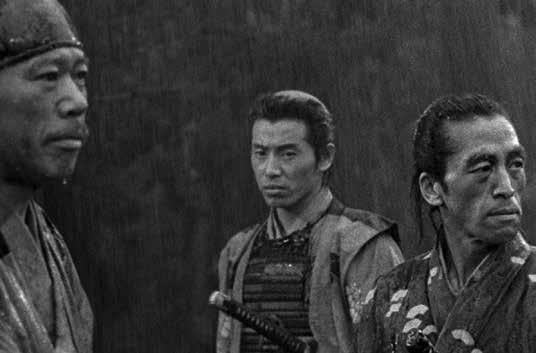
Kurosawa Akira
207 min. 35mm
In Japanese with English subtitles
“The glorious vigour and strength of this film is presented with such theatrical relish and flair: its energy flashes out of the screen like a sword.”
Peter Bradshaw, The Guardian
Set in 16th-century Japan, Seven Samurai follows a group of swordsmen hired to defend a village against 40 marauding bandits. Its debt to the Hollywood Western was openly acknowledged by Kurosawa; Seven Samurai, in turn, influenced a wide range of films from Spaghetti Westerns to Star Wars. Kurosawa pioneered the use of multiple cameras and the telephoto lens for the tour-deforce battle sequences. Kurosawa mainstays Mifune Toshiro and Shimura Takashi head the large cast.
The greatest foreign-language film of all time 2018 BBC Poll
Tickets to the free 2:00 pm screening will be available on a first-come, first-served basis starting at 12:00 pm.
Cinematheque! Take a tour of the projection booth and join our Learning & Outreach team for a kid-friendly photo activity. Check out our spiffy new renovations and grab a free popcorn before settling in to watch Kurosawa’s epic Seven Samurai on 35mm.
37
The Cinematheque’s 2023
July 1 (Saturday) Free Admission 2:00 pm

1131
thecinematheque.ca
Howe Street, Vancouver















































 Muriel Del Don, Cineuropa
Muriel Del Don, Cineuropa


































 Curated by Harry Killas
Curated by Harry Killas













 Harry Killas
Harry Killas



